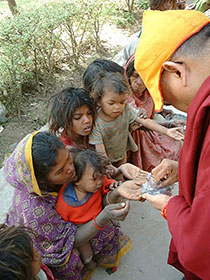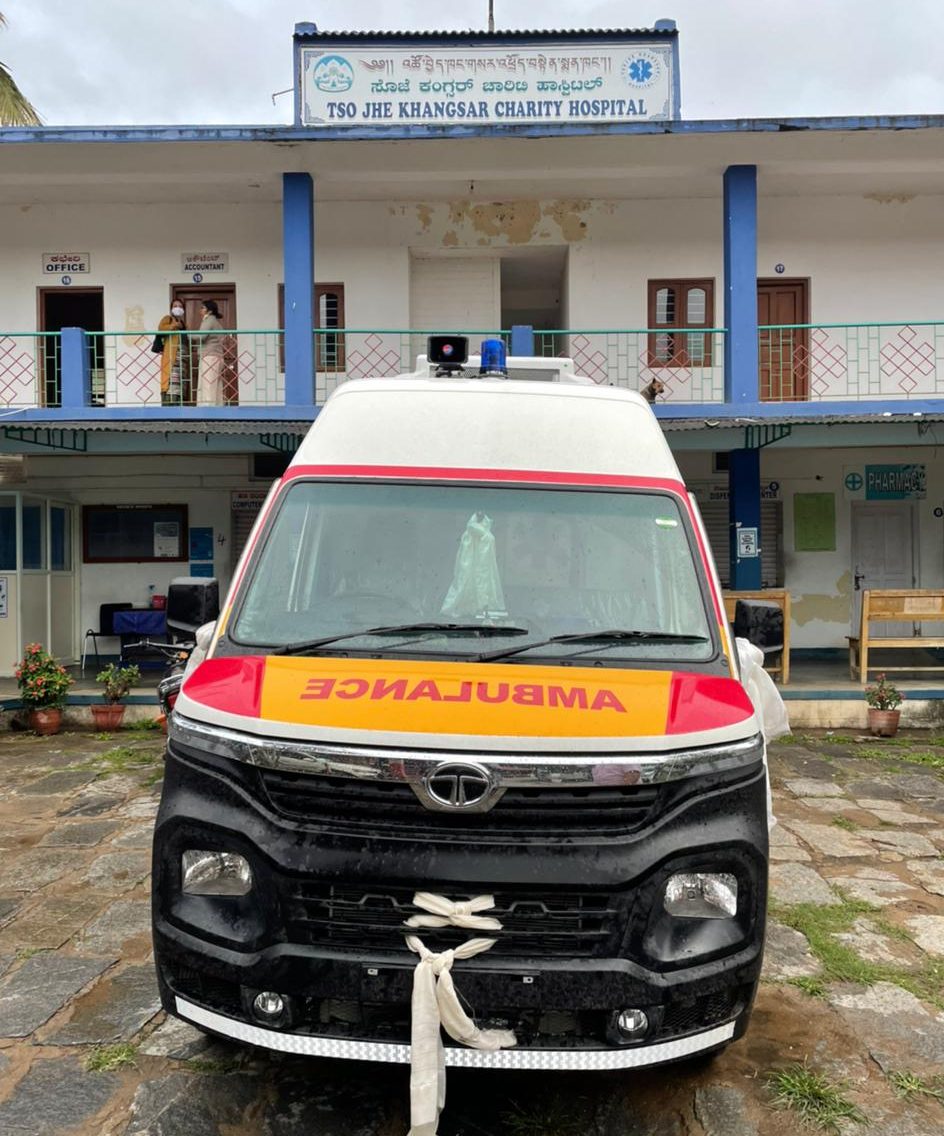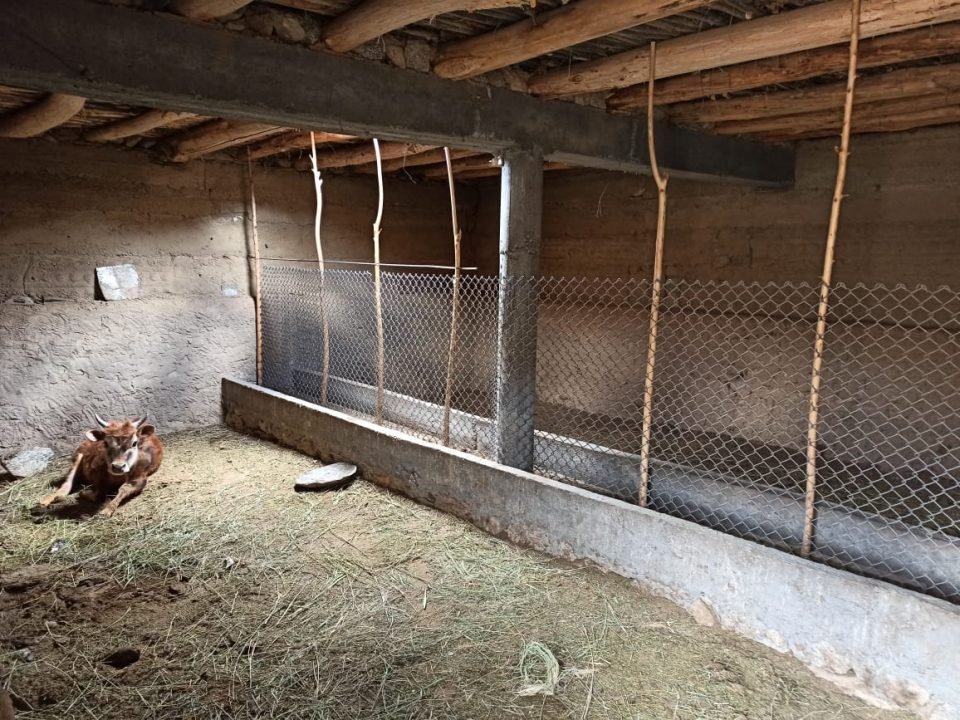- Home
- FPMT Homepage
Foundation for the Preservation of the Mahayana Tradition
The FPMT is an organization devoted to preserving and spreading Mahayana Buddhism worldwide by creating opportunities to listen, reflect, meditate, practice and actualize the unmistaken teachings of the Buddha and based on that experience spreading the Dharma to sentient beings. We provide integrated education through which people’s minds and hearts can be transformed into their highest potential for the benefit of others, inspired by an attitude of universal responsibility and service. We are committed to creating harmonious environments and helping all beings develop their full potential of infinite wisdom and compassion. Our organization is based on the Buddhist tradition of Lama Tsongkhapa of Tibet as taught to us by our founders Lama Thubten Yeshe and Lama Thubten Zopa Rinpoche.
- Willkommen
Die Stiftung zur Erhaltung der Mahayana Tradition (FPMT) ist eine Organisation, die sich weltweit für die Erhaltung und Verbreitung des Mahayana-Buddhismus einsetzt, indem sie Möglichkeiten schafft, den makellosen Lehren des Buddha zuzuhören, über sie zur reflektieren und zu meditieren und auf der Grundlage dieser Erfahrung das Dharma unter den Lebewesen zu verbreiten.
Wir bieten integrierte Schulungswege an, durch denen der Geist und das Herz der Menschen in ihr höchstes Potential verwandelt werden zum Wohl der anderen – inspiriert durch eine Haltung der universellen Verantwortung und dem Wunsch zu dienen. Wir haben uns verpflichtet, harmonische Umgebungen zu schaffen und allen Wesen zu helfen, ihr volles Potenzial unendlicher Weisheit und grenzenlosen Mitgefühls zu verwirklichen.
Unsere Organisation basiert auf der buddhistischen Tradition von Lama Tsongkhapa von Tibet, so wie sie uns von unseren Gründern Lama Thubten Yeshe und Lama Thubten Zopa Rinpoche gelehrt wird.
- Bienvenidos
La Fundación para la preservación de la tradición Mahayana (FPMT) es una organización que se dedica a preservar y difundir el budismo Mahayana en todo el mundo, creando oportunidades para escuchar, reflexionar, meditar, practicar y actualizar las enseñanzas inconfundibles de Buda y en base a esa experiencia difundir el Dharma a los seres.
Proporcionamos una educación integrada a través de la cual las mentes y los corazones de las personas se pueden transformar en su mayor potencial para el beneficio de los demás, inspirados por una actitud de responsabilidad y servicio universales. Estamos comprometidos a crear ambientes armoniosos y ayudar a todos los seres a desarrollar todo su potencial de infinita sabiduría y compasión.
Nuestra organización se basa en la tradición budista de Lama Tsongkhapa del Tíbet como nos lo enseñaron nuestros fundadores Lama Thubten Yeshe y Lama Zopa Rinpoche.
A continuación puede ver una lista de los centros y sus páginas web en su lengua preferida.
- Bienvenue
L’organisation de la FPMT a pour vocation la préservation et la diffusion du bouddhisme du mahayana dans le monde entier. Elle offre l’opportunité d’écouter, de réfléchir, de méditer, de pratiquer et de réaliser les enseignements excellents du Bouddha, pour ensuite transmettre le Dharma à tous les êtres. Nous proposons une formation intégrée grâce à laquelle le cœur et l’esprit de chacun peuvent accomplir leur potentiel le plus élevé pour le bien d’autrui, inspirés par le sens du service et une responsabilité universelle. Nous nous engageons à créer un environnement harmonieux et à aider tous les êtres à épanouir leur potentiel illimité de compassion et de sagesse. Notre organisation s’appuie sur la tradition guéloukpa de Lama Tsongkhapa du Tibet, telle qu’elle a été enseignée par nos fondateurs Lama Thoubtèn Yéshé et Lama Zopa Rinpoché.
Visitez le site de notre Editions Mahayana pour les traductions, conseils et nouvelles du Bureau international en français.
Voici une liste de centres et de leurs sites dans votre langue préférée
- Benvenuto
L’FPMT è un organizzazione il cui scopo è preservare e diffondere il Buddhismo Mahayana nel mondo, creando occasioni di ascolto, riflessione, meditazione e pratica dei perfetti insegnamenti del Buddha, al fine di attualizzare e diffondere il Dharma fra tutti gli esseri senzienti.
Offriamo un’educazione integrata, che può trasformare la mente e i cuori delle persone nel loro massimo potenziale, per il beneficio di tutti gli esseri, ispirati da un’attitudine di responsabilità universale e di servizio.
Il nostro obiettivo è quello di creare contesti armoniosi e aiutare tutti gli esseri a sviluppare in modo completo le proprie potenzialità di infinita saggezza e compassione.
La nostra organizzazione si basa sulla tradizione buddhista di Lama Tsongkhapa del Tibet, così come ci è stata insegnata dai nostri fondatori Lama Thubten Yeshe e Lama Zopa Rinpoche.
Di seguito potete trovare un elenco dei centri e dei loro siti nella lingua da voi prescelta.
- 欢迎 / 歡迎
简体中文
“护持大乘法脉基金会”( 英文简称:FPMT。全名:Foundation for the Preservation of the Mahayana Tradition) 是一个致力于护持和弘扬大乘佛法的国际佛教组织。我们提供听闻,思维,禅修,修行和实证佛陀无误教法的机会,以便让一切众生都能够享受佛法的指引和滋润。
我们全力创造和谐融洽的环境, 为人们提供解行并重的完整佛法教育,以便启发内在的环宇悲心及责任心,并开发内心所蕴藏的巨大潜能 — 无限的智慧与悲心 — 以便利益和服务一切有情。
FPMT的创办人是图腾耶喜喇嘛和喇嘛梭巴仁波切。我们所修习的是由两位上师所教导的,西藏喀巴大师的佛法传承。
繁體中文
護持大乘法脈基金會”( 英文簡稱:FPMT。全名:Found
ation for the Preservation of the Mahayana Tradition ) 是一個致力於護持和弘揚大乘佛法的國際佛教組織。我們提供聽聞, 思維,禪修,修行和實證佛陀無誤教法的機會,以便讓一切眾生都能 夠享受佛法的指引和滋潤。 我們全力創造和諧融洽的環境,
為人們提供解行並重的完整佛法教育,以便啟發內在的環宇悲心及責 任心,並開發內心所蘊藏的巨大潛能 — 無限的智慧與悲心 – – 以便利益和服務一切有情。 FPMT的創辦人是圖騰耶喜喇嘛和喇嘛梭巴仁波切。
我們所修習的是由兩位上師所教導的,西藏喀巴大師的佛法傳承。 察看道场信息:
- FPMT Homepage
- News/Media
-
- Study & Practice
-
-
- About FPMT Education Services
- Latest News
- Programs
- New to Buddhism?
- Buddhist Mind Science: Activating Your Potential
- Heart Advice for Death and Dying
- Discovering Buddhism
- Living in the Path
- Exploring Buddhism
- FPMT Basic Program
- FPMT Masters Program
- FPMT In-Depth Meditation Training
- Maitripa College
- Lotsawa Rinchen Zangpo Translator Program
- Universal Education for Compassion & Wisdom
- Online Learning Center
-
- Prayers & Practice Materials
- Overview of Prayers & Practices
- Full Catalogue of Prayers & Practice Materials
- Explore Popular Topics
- Benefiting Animals
- Chenrezig Resources
- Death & Dying Resources
- Lama Chopa (Guru Puja)
- Lama Zopa Rinpoche: Compendium of Precious Instructions
- Lama Zopa Rinpoche: Life Practice Advice
- Lama Zopa Rinpoche Practice Series
- Lamrim Resources
- Mantras
- Prayer Book Updates
- Purification Practices
- Sutras
- Thought Transformation (Lojong)
- Audio Materials
- Dharma Dates - Tibetan Calendar
- Translation Services
- Publishing Services
- Ways to Offer Support
- Prayers & Practice Materials
-
- Teachings and Advice
- Find Teachings and Advice
- Lama Zopa Rinpoche Advice Page
- Lama Zopa Rinpoche: Compendium of Precious Instructions
- Lama Zopa Rinpoche Video Teachings
- ༧སྐྱབས་རྗེ་བཟོད་པ་རིན་པོ་ཆེ་མཆོག་ནས་སྩལ་བའི་བཀའ་སློབ་བརྙན་འཕྲིན།
- Podcasts
- Lama Yeshe Wisdom Archive
- Buddhism FAQ
- Dharma for Young People
- Resources on Holy Objects
- Teachings and Advice
-
-
*If a menu item has a submenu clicking once will expand the menu clicking twice will open the page.
-
-
- Centers
-
- Teachers
-
- Projects
-
-
-
-
*If a menu item has a submenu clicking once will expand the menu clicking twice will open the page.
-
-
- FPMT
-
-
-
-
-
Approaching enlightenment is a gradual process, but once you attain it, there’s no going back; when you reach the fully awakened state of mind, the moment you experience that, you remain enlightened forever.
Lama Zopa Rinpoche
-
-
-
- Shop
-
-
-
The Foundation Store is FPMT’s online shop and features a vast selection of Buddhist study and practice materials written or recommended by our lineage gurus. These items include homestudy programs, prayers and practices in PDF or eBook format, materials for children, and other resources to support practitioners.
Items displayed in the shop are made available for Dharma practice and educational purposes, and never for the purpose of profiting from their sale. Please read FPMT Foundation Store Policy Regarding Dharma Items for more information.
-
-
Social Services Fund News
12
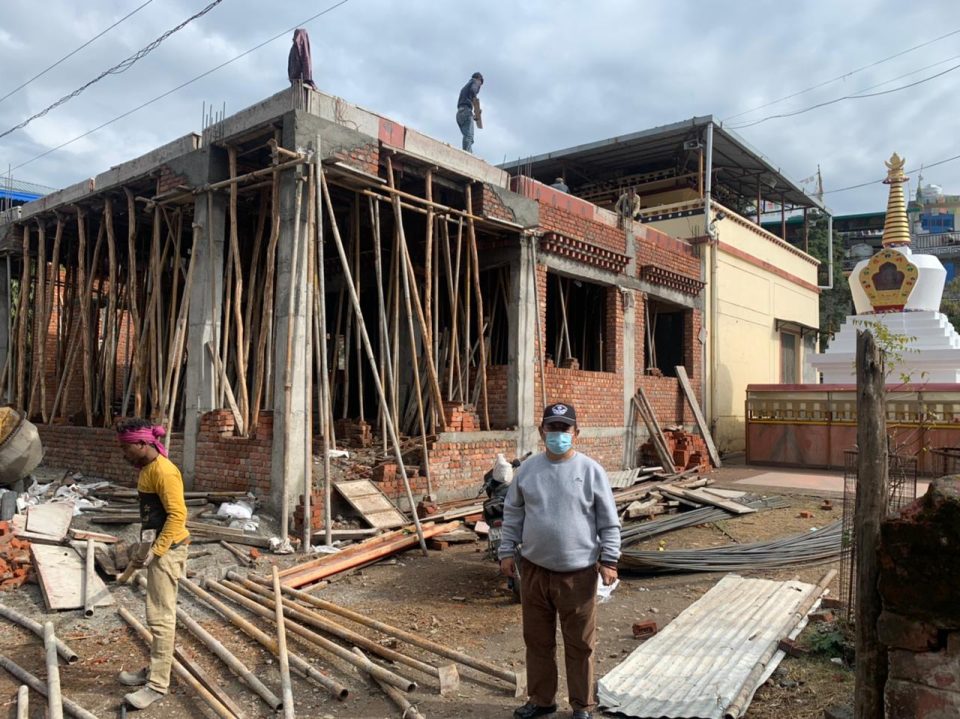
Continued progress on the new temple for Dekyiling Tibetan Settlement, Dehru, India.
A priority for FPMT Charitable Projects is to offer support to Tibetan settlements in various ways. Over 94,000 Tibetan refugees currently reside in India, where our support is focused. Dekyiling Tibetan Settlement is located near Dehru Dun, India. The Social Services Fund recently offered a grant to this settlement for funds needed to renovate their temple which is used for various Dharma activities, pujas, public teachings, initiations, and for welcoming high lamas and geshes. Their current temple would become too congested during gatherings and they lacked space for holy objects. Thanks to a kind and generous benefactor, US$35,105 was raised for this project.
According to Lama Zopa Rinpoche, Buddha explained in the Mindfulness Sutra the benefits of setting up rooms for monks, shelters, monasteries, and temples where there are holy objects of Buddha, Dharma, and Sangha– and holy objects of statues, stupas, and scriptures. This is called the abiding place. Abiding there is Buddha, Dharma, and Sangha. So the abiding place is a great, great place to subdue the mind, collect extensive merit, and to achieve enlightenment.
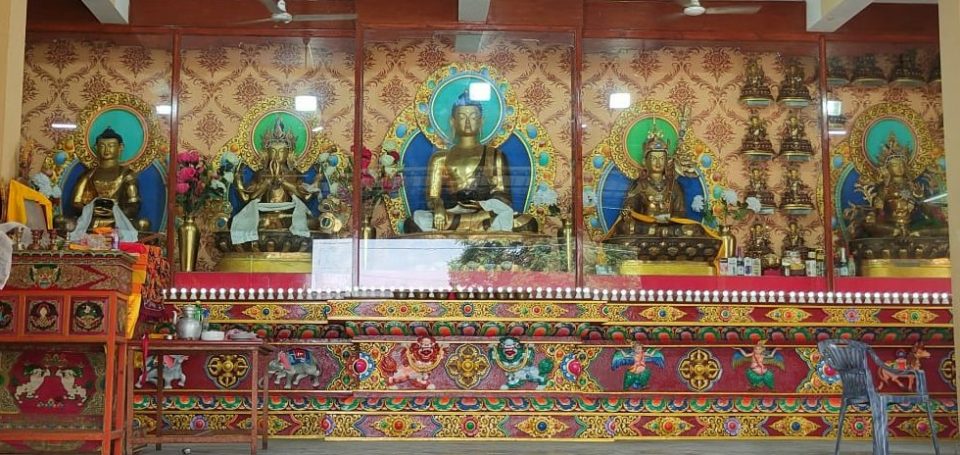
Some of the holy objects that need a proper temple for veneration at Dekyiling Tibetan Settlement.
Recently, the first foundation for the new temple was dug and laid, columns positioned and cast, brickwork and formation of window and door openings were completed. The metalwork support for the concrete roof is complete and they will soon be ready to pour the concrete. This will have to be left for twenty-one days to dry and then they can remove the supports and start the plastering inside and outside. Once that is dry, the painting can begin.
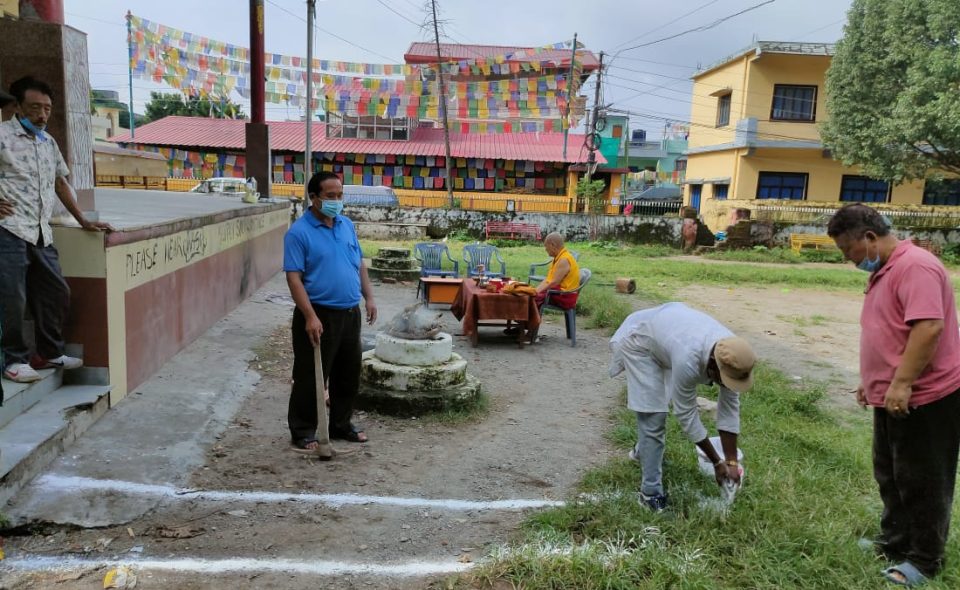
Beginning stages of renovation on the new temple at Dekyiling Tibetan Settlement .
Please join us in rejoicing that the support offered will assist this settlement maintain a vibrant and active community Dharma program at their temple, and contribute to the preservation of Tibetan culture within the population in India.
All are welcome to support the Social Services Fund and help ensure we can continue to offer direct support to Tibetan settlements.
9
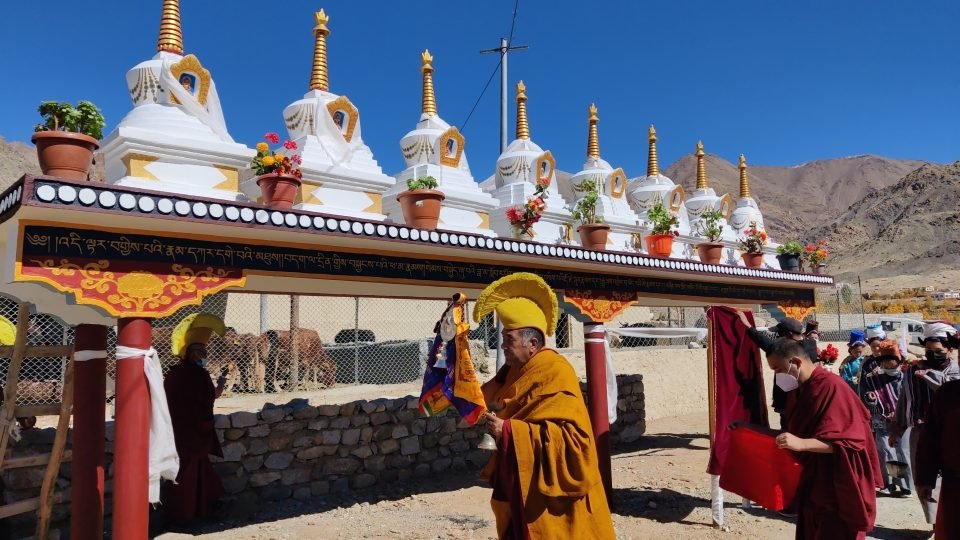
Inauguration of the eight new stupas to benefit the animals at Taru Gayphel Tsogspa Animal Welfare Society, Ladakh, October 20, 2021.
Earlier this year we shared news that we offered support to Taru Gayphel Tsogspa Animal Welfare Society, an animal sanctuary that is caring for fifty bulls, twenty cows, ten sheep, and five donkeys in Leh, Ladakh. In addition to a grant offered from the Animal Liberation Fund to help fund and expand their operation, Lama Zopa Rinpoche also advised and sponsored eight stupas, to be built on the land so that animals can circumambulate them to create merit, purify negativities, and plant positive seeds for the future. This is one unique way Rinpoche recommends to benefit animals, not only emphasizing the need for material care like shelter, medical care, and food which are so important for wellbeing in this life, but also the ultimate benefit to the animals in future lives, through taking them around holy objects, playing mantras, and so forth.
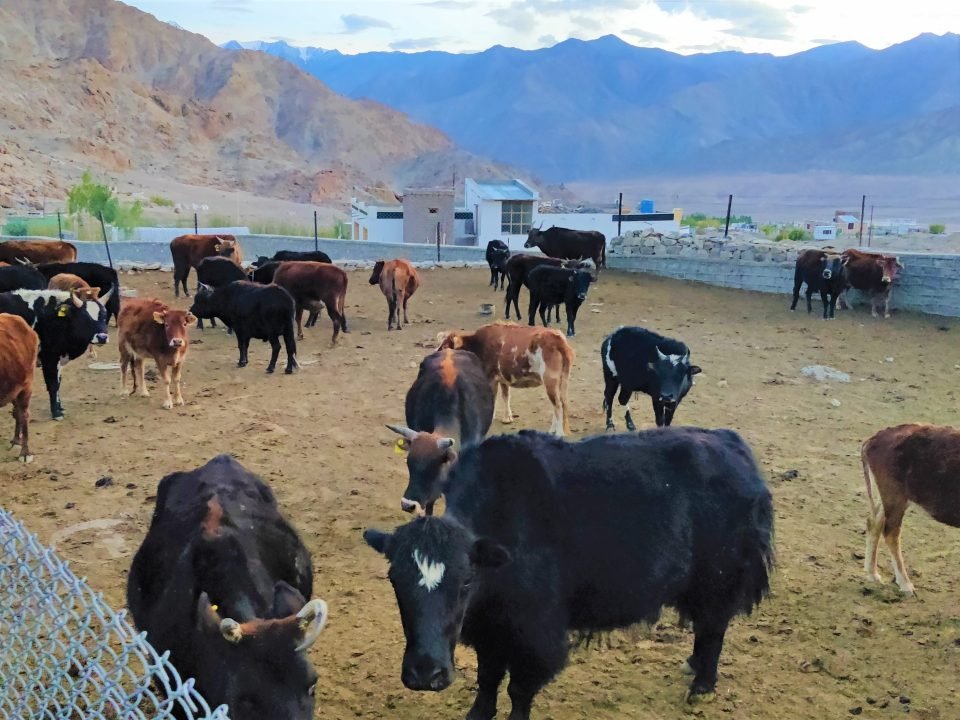
Some of the animals of Taru Gayphel Tsogspa Animal Welfare Society.
Please join us in rejoicing that these eight stupas are now completed and were recently inaugurated. Sangha from Ngari Institute, Taru villagers, and several esteemed guests joined for this joyous event as well. The beautiful stupas are placed easily for all the animals to circumambulate whenever possible.
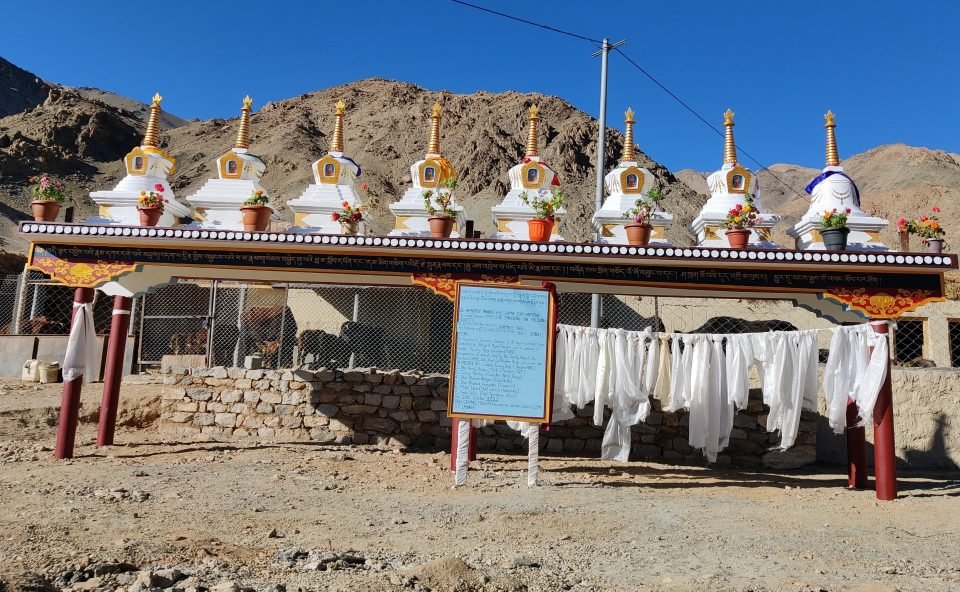
Beautiful new stupas which will benefit the animals of Taru Gayphel Tsogspa.
About circumambulating stupas, Lama Zopa Rinpoche has said, “One receives skies of benefit, inconceivable merit. There is no deflation and inflation. It’s not like the value of gold or the dollar and so forth, which goes up and down; it’s not like the value of material things, which goes up and down. The resultant happiness is inconceivable due to the power of the object, of the Buddha, it’s always the same. Due to things being empty of existing from their own side, dependent arising, it’s always the same. The Buddha’s power never decreases, the Buddha’s compassion toward sentient beings never decreases, the Buddha’s qualities never decrease, they are always the same, having infinite qualities and never decreasing. Therefore, all these practices that we do—circumambulation, prostrations, offering—even to a statue or a painting of Buddha, the benefit is always infinite.
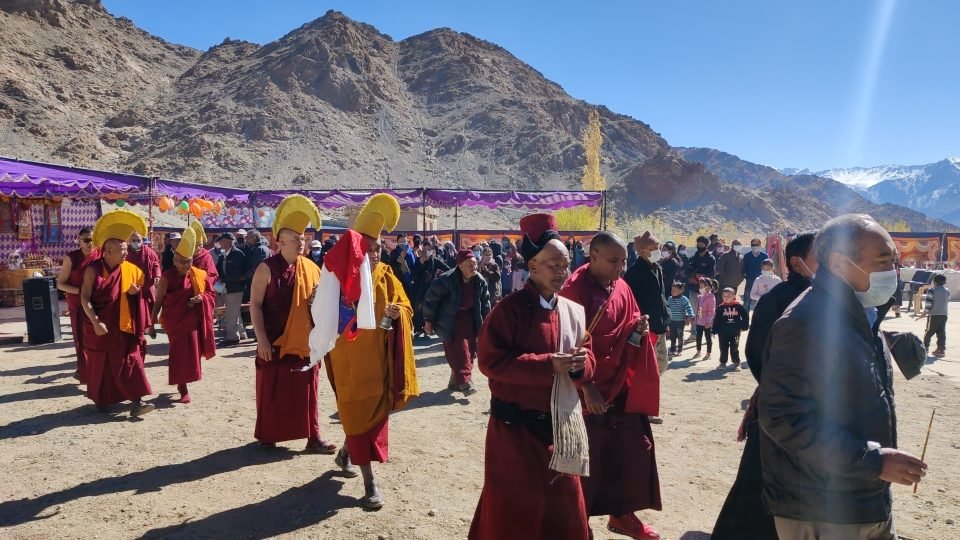
Many joined in the joyous occasion of the stupa inauguration.
Taru Gayphel Tsogspa offered the following words of thanks, “We would like to heartfelt thanks His Eminence Lama Zopa Rinpoche, Ven. Roger Kunsang, and all the devotees and sponsors, without their support this would not be completed. May this merit cause all sentient beings to be free from suffering and complete enlightenment. Long live His Holiness the Dalai Lama and His Eminence Lama Zopa Rinpoche.”
You can read more about our support offered to Taru Gayphel Tsogspa Animal Welfare Society.
All are welcome to support the Animal Liberation Fund and Stupa Fund and help ensure beneficial grants like this can continue.
9
Two New Ambulances for the Benefit of Tibetan Settlements
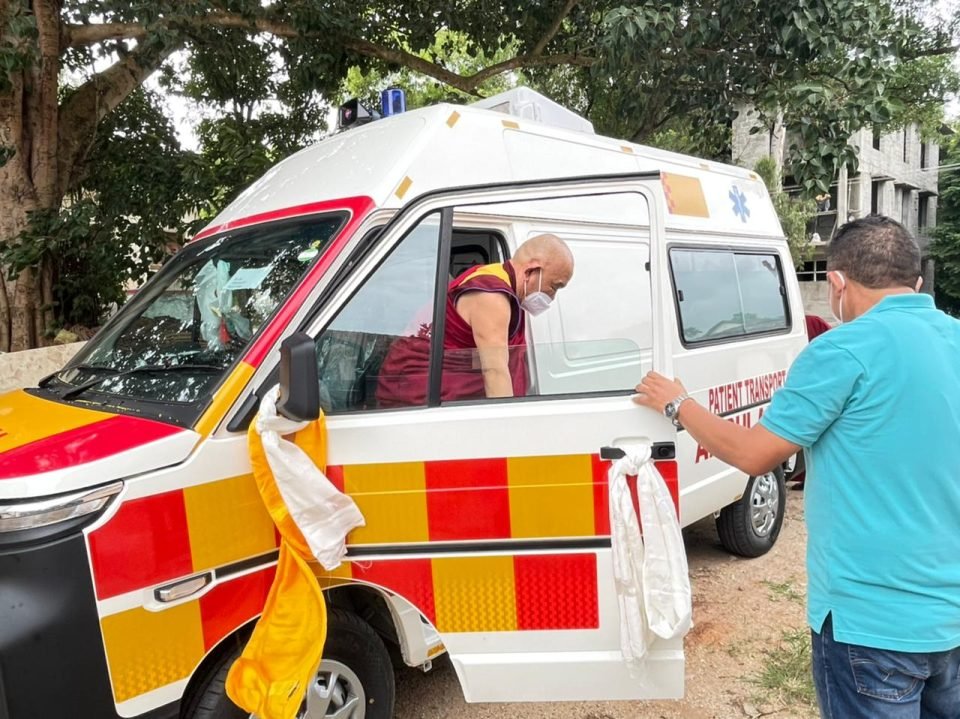
A monk blessing the new ambulance for Rabgayling Tibetan Settlement.
We were very happy to share news of sponsorship for two ambulances in two different Tibetan settlements in India, through the Social Services Fund.
Rabgayling Tibetan Settlement in Hunsur, India is situated on 2,000 acres and was established in 1971 for the development of villages, hospitals, schools and monasteries. The population of this settlement is currently at 1,900. This settlement has an elderly home that serves twenty residents which we have been supporting since 2016. We were delighted to sponsor a new ambulance which will be used to transport those in need of care to Phende Hospital located on the settlement.
An ambulance was also sponsored for transportation to Tsojhe Khangsar Hospital for individuals from two Tibetan settlements in Bylakuppe, India, encompassing 20,000 people including monks and nuns residing in surrounding monasteries and nunneries. The ambulance was consecrated by some monks of Sera Je Monastery. We have been supporting an elderly home in one of these settlements, Lugsam Samduling, which serves nearly fifty elderly residents, since 2016.
Lama Zopa Rinpoche offered advice to have special stickers and mantras—such as Namgyalma Mantra and Lotus Pinnacle of Amoghapasha Mantra—put on the ambulances to bless all the people who use them and see them, thus making these vehicles not only the means for others to receive medical support they desperately need, but to create merit and make a Dharma connection every time they enter or see the ambulances.
Please join us in rejoicing in the utilization of these two ambulances within Tibetan settlements in India.
All are welcome to support the Social Services Fund and help ensure we can offer direct support to those in need.
- Tagged: elderly homes, lugsam samduling settlement, rabgayling tibetan settlement, social services fund
20
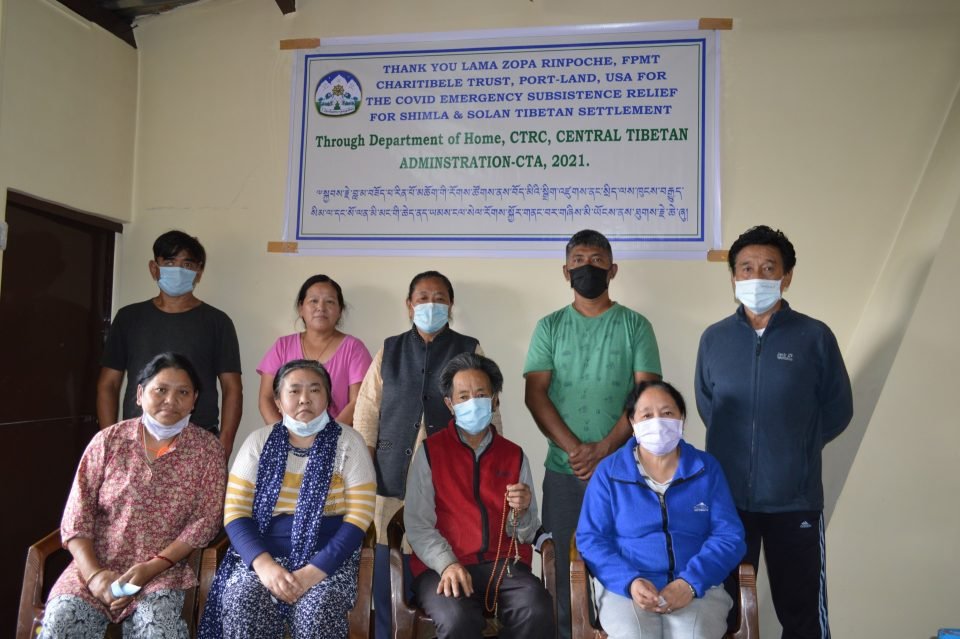
Recipients of the pandemic aid offered through a grant from FPMT Charitable Projects.
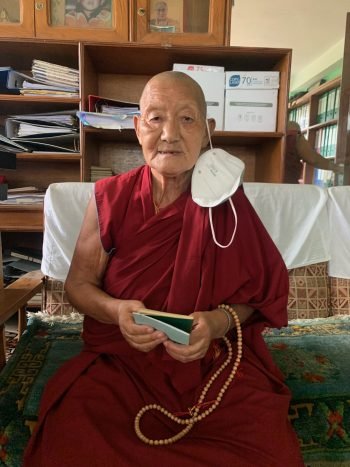
Pandemic aid recipient expresses thanks to FPMT Charitable Projects.
Recently His Holiness the Dalai Lama’s Central Tibetan Relief Committee, the Department of the Home, arranged special support in the form of direct cash assistance as a relief measure to alleviate the financial burden of vulnerable Tibetans affected by the pandemic. The aim of this offering was to prevent Tibetan households and destitute people in India, Nepal, and Bhutan from falling into poverty due to their inability to earn income during the pandemic.
When Lama Zopa Rinpoche heard of these efforts he immediately wanted to offer support to this initiative with a grant in the amount of US$50,000.
Due to this grant, a total of thirty-eight settlements in India, Nepal, and Bhutan were helped: 196 vulnerable households were given Rs. 10,000 and 340 destitute elders were given Rs. 5,000.
Rinpoche also recently offered a US$20,000 grant to Kopan Helping Hands for their work distributing food to 400 families affected by the pandemic who have lost their livelihoods and also for working with trusted local contacts to identify elderly people living by themselves and families without any means of support in the Upper Solu Khumbu area of Nepal. Food will likely be distributed to them through the local shops.
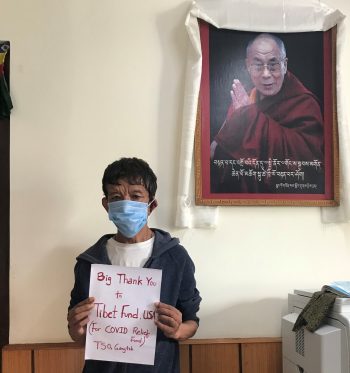
Pandemic aid recipient expresses thanks to FPMT Charitable Projects.
The financial impact of the pandemic has been especially devastating for the poorest households in Tibetan settlements. According to a rapid survey conducted in June, 2,774 households across India, Nepal, and Bhutan are now struggling to afford basic necessities and are at risk of falling into a cycle of poverty from which they cannot soon reemerge.
Thanks to so many generous donors we are able to offer grants like this that have direct impact on the lives of those who truly need support and kindness.
All are welcome to be part of the aid we are able to provide through our Social Services Fund by donating any amount or rejoicing in work we do.
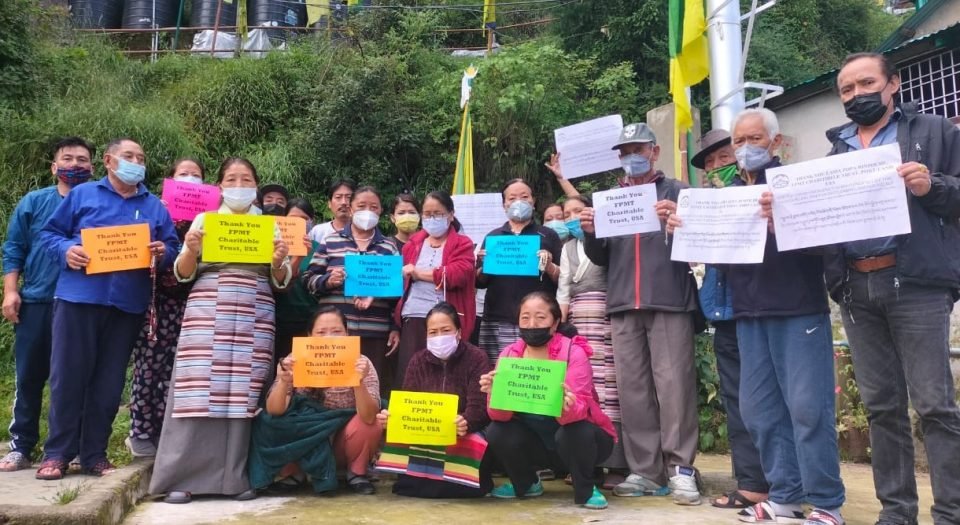
Words of appreciation from those who benefited from a recent distribution of aid from Central Tibetan Relief Committee.
Please learn more about the Social Services Fund and all of the ways we offer support toward those in need.
15
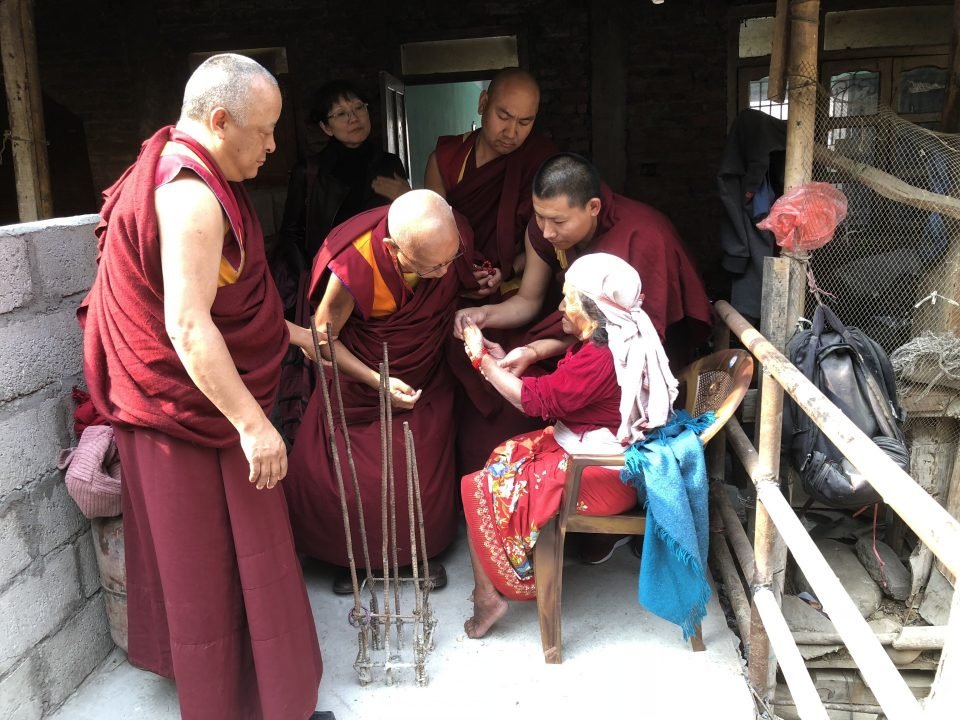
Lama Zopa Rinpoche blessing a sick elderly woman in Maratika, Nepal. Photo by Ven. Roger Kunsang.
The FPMT Social Services Fund offers grants to beneficial projects primarily in India, Nepal, and Mongolia, which are aimed at serving children, the elderly, the sick, and very poor. We offer grants for schools, hospices, health clinics, soup kitchens, and elderly homes. In addition, due to shutdowns in 2021, we also offered food and monetary assistance to thousands of families in need.
We would like to invite you to rejoice in some of the grants recently offered specifically toward medical care, living expenses, and food to those in India, Nepal and Mongolia.
Patient Care Trust, India
Patient Care Trust (PCT) is an NGO operating in India, with a large proportion of its field work being conducted in Northern India. The NGO facilitates access to quality healthcare and also organizes free medical camps with partner hospitals. The mission of this project is to provide timely access to affordable quality healthcare for the socially marginalized Tibetan Refugees.
Tibetans refugees in India are disproportionately exposed to risk due to lack of access to quality healthcare. Because of a variety of factors, many of them have a choice between costly but timely access to healthcare in private institutions, or affordable but untimely access through Indian public hospitals. As such, Tibetan refugees either give up on healthcare access, or contract high levels of debt. Most Tibetan refugees reside in rural areas of India, where local facilities are understaffed and under equipped. Additionally, reputed public government hospitals in urban areas such as Delhi have a waiting list of five to six months, but lower average costs. A number of Tibetan refugees are monks or nuns receiving very little or very low income and many have no income at all, especially the newly exiled from Tibet, who sometimes cannot speak English or Hindi. Due to these factors, the Tibetan refugees in India suffer from direct and disproportionate access to quality healthcare, particularly in the case of emergency treatment.
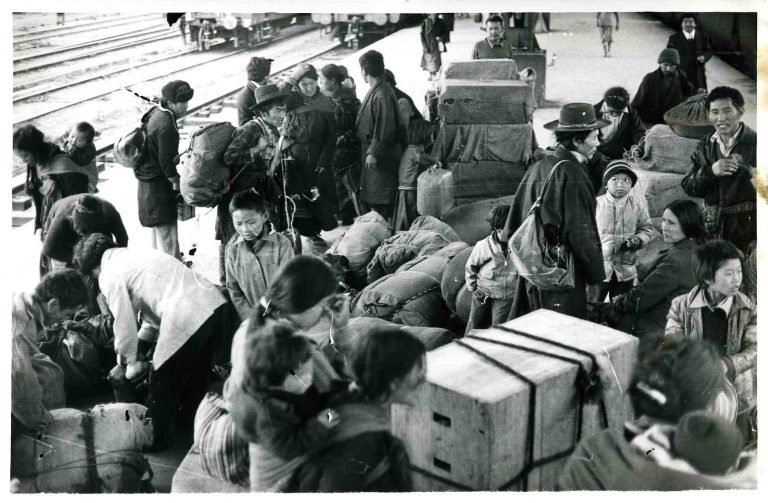
Tibetan refugees arriving in India sixty years ago. Photo courtesy of Tibet Relief Fund.
Since 2012 over 4,500 vulnerable patients have been assisted by this project. In 2021 the Social Services Fund was happy to support the important work of Patient Care Trust by covering the operational budget for an entire year with a grant of US$27,954.
Shakyamuni Buddha Clinic, India
Shakyamuni Buddha Health Clinic, a social service project of Root Institute, Bodhgaya, began in 1991 as a home for the destitute and has evolved into a diverse community health program encompassing a wide range of medical and rehabilitative services and health promotion activities.
The clinic continued to do important work in the community in 2020, some highlights are:
- The purchasing of a new Mobile Clinic vehicle that will serve hundreds of families in remote villages every week for those who cannot come to Root Institute. Through this, doctors, health educators, and physiotherapists brought much needed care to many poor families.
- The Adolescent Girls Health Training classes continued. The mission of this program is to create awareness regarding the dangers of child marriages and domestic violence, and the value of education, health, and hygiene for women for the overall wellbeing of the family.
- The teachers and students of Maitreya School, also a project of Root Institute, participated in a workshop on menstrual health and hygiene organized by Sakya Hospital. The students then continued to share this learning with students of other schools.
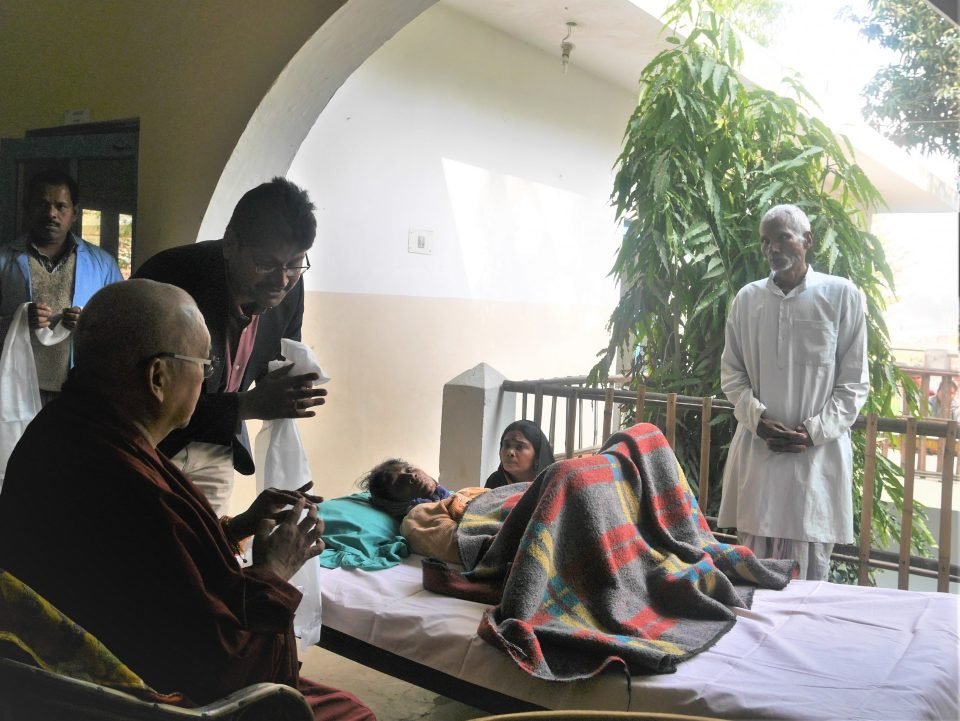
Lama Zopa Rinpoche blessing a very sick patient of Shakyamuni Health Clinic in 2017.
The clinic was required to shut it’s doors in March 2020 due to the lockdown declared by the government of India. The doctors however, continued to help patients in their personal capacities. They also distributed medicine and helped the community in whatever way they could. In February 2021, the clinic reopened with all required protocols.
The annual cost of operations for the clinic is US$30,292 and in 2021 we were very happy, through the Social Services Fund, to offer US$14,700 toward these operating expenses.
The Social Services Fund has been providing annual grants to the incredible work of Shakyamuni Buddha Clinic since 2012 and in total has offered over US$172,000.
Lamp of the Path, Mongolia
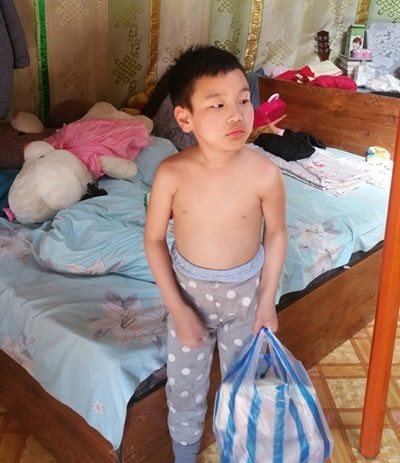
A young recipient of Lamp of the Path’s services in Mongolia.
Lamp of the Path NGO (LOP), part of Ganden Do Ngag Shedrup Ling, has offered social services to some of the poor and homeless living in Ulaanbaatar, Mongolia for the past eighteen years. The soup kitchen, which is its main program, offers food to those in need and free medical support is offered through a health clinic. LOP also helps bring awareness to the epidemic of alcoholism in Mongolia and offers tuberculosis checkups for the disadvantaged in the area.
A grant for US$35,281 was offered to this beneficial project toward the 2021 operating budget.
The Social Services Fund has been providing annual grants to the incredible work of LOP since 2012 and in total has offered over US$318,000.
Please watch this moving video featuring the lives of three individuals who have been positively impacted by the services offered by Lamp of the Path.
MAITRI Charitable Trust, Bodhgaya
MAITRI is engaged in the eradication of leprosy, the control of TB, medical assistance and care for expecting mothers and new born babies, life-saving assistance to malnourished small children, education of children and adults in rural areas, rehabilitation of disabled people, the provision of opportunities to women and other underprivileged people, promotion of a holistic development in villages, rescuing and care of animals, and awareness campaigns for all of these programs.
In 2021 during the lockdowns, MAITRI’s work continued, as they had inpatients in the hospital and animals in the shelter, the staff came to work regularly. They were provided with face masks and Vitamins C and D to boost their immune system and the staff were grateful to have a regular job and regular income. Registered patients of the TB and mother and child care programs defied the lockdown restrictions and came to the gates for their monthly rations which MAITRI duly provided.
During the year the programs continued with new patients being registered and others being released from treatment. In particular, MAITRI helped to hospitalize two leprosy patients and with MAITRI’s special treatment their condition has been greatly improving. The work of the animal care program continued with the rescuing of animals in distress and injured, including a monkey.
A grant for US$68,600 was offered to this beneficial project in 2021 toward the operating budget.
The Social Services Fund has been providing annual grants to the incredible work of MAITRI since 2012 and in total has offered over US$606,000.
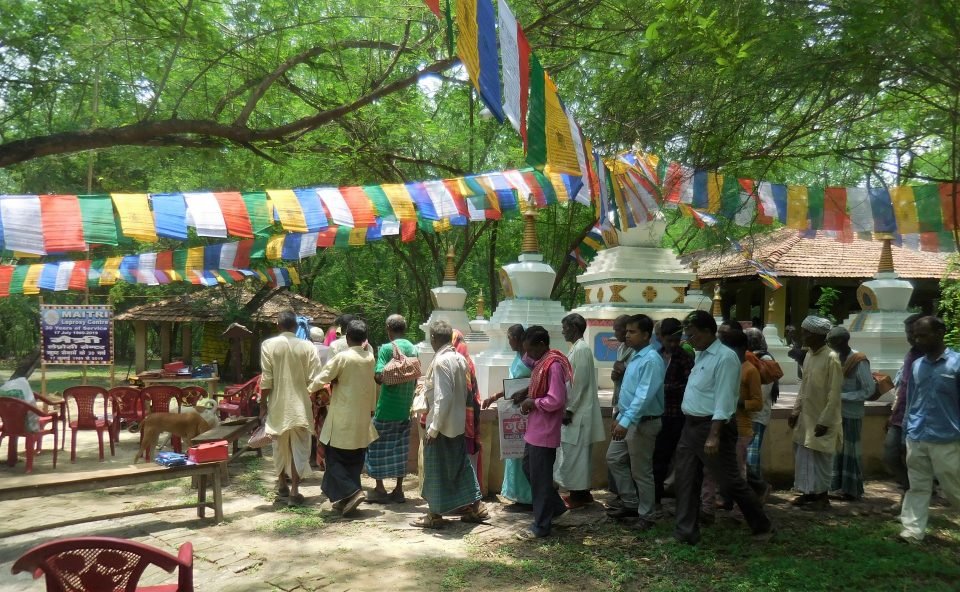
Participants of a community event gathered around stupas at MAITRI Charitable Project, July 2019.
Helping Nepali and Tibetan Refugees Affected by the Pandemic
Kopan Helping Hands has been distributing food to families affected by the pandemic and who have lost their livelihood due to the lockdowns and restrictions. Kopan is working with the local government to identify families most in need and distribute food to as many as 400 families. In addition, Kopan is working with trusted local contacts to identify elderly people living by themselves and families without any means of support in the Upper Solu Khumbu area of Nepal. Food will likely be distributed to them through the local shops. Lama Zopa Rinpoche recently spoke to the senior Kopan monks about how important it is for monks and nuns to engage in social activities that directly relieve the suffering of sentient beings. However, in addition to the immediate benefit, Rinpoche emphasized that by seeing monks and nuns do activities for their benefit, people will develop faith in them and this will plant the seed of liberation in their minds and cause them in future lives to meet the Dharma and the Sangha.
Lama Zopa Rinpoche offered a grant of US$20,000 to Kopan Helping Hands toward these food distribution efforts.
The Central Tibetan Relief Committee (CTA) arranged support in the form of direct cash assistance as an emergency relief measure, to alleviate the financial burden of the most vulnerable households. Cash assistance will help these homes meet basic nutrition and financial security needs over the next several months, and prevent them from falling into deep poverty due to their inability to earn income during the pandemic.
The financial impact of the pandemic has been especially devastating for the poorest households in Tibetan settlements. According to a rapid survey conducted in June, 2,774 households across India, Nepal, and Bhutan are now struggling to afford basic necessities, and are at risk of falling into a cycle of poverty from which they cannot soon reemerge. The CTA offered a one-time payment of 10,000 Indian rupees for each household (1,000 rupees per month for ten months).
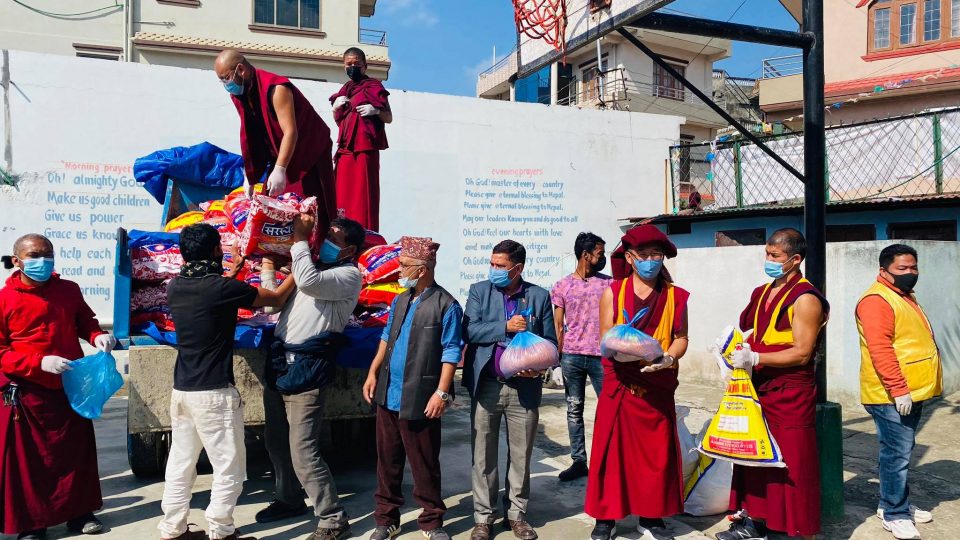
Kopan Sangha distributing emergency aid to those in need during covid-19 crisis in Nepal. Photo courtesy of Kopan Monastery Facebook page.
Emergency cash relief is expected to help enable them to maintain financial stability in the short term, and increase their ability to regain or advance toward self-reliance when economic activity normalizes.
Lama Zopa Rinpoche offered a grant of US$50,000 toward this beneficial initiative of the CTA.
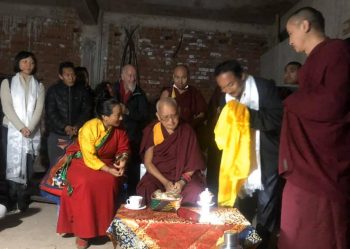
Lama Zopa Rinpoche and Khadro-la visiting the site where the new Tsum Community Center is being built, in 2020.
Tsum Community Center, Nepal
This year the Social Services Fund was happy to support the construction of a new community center in Kathmandu to support those from the Tsum region. This new community center is being built in the area of Swayambhunath and the community center will serve as a place for people to gather and offer prayers, particularly at the time of death, by offering a space for the final rituals before cremation. The other objective of this center is to teach the younger generation in the area about the cultural traditions of Buddhism as they are not taught this in their schools.
In 2021 US$ 40,996 was offered toward the building expenses of this community center.
Rejoice!
Please join us in rejoicing in some of the ways that FPMT is offering direct support for those most in need in India, Nepal, and Mongolia by providing grants for medical and heath care, food, and living expenses. In 2021 we have offered US$257,531 so far this year. Thank you to the many who make these grants possible and continue to support the Social Services Fund.
All are welcome to support the Social Services Fund and help ensure we can continue to offer support toward the health of those in need.
- Tagged: kopan helping hands, lamp of the path, maitri charitable trust, patient care trust, shakyamuni buddha health care center, tsum
10
Benefiting the Animals– Rejoicing in a Year of Support Offered
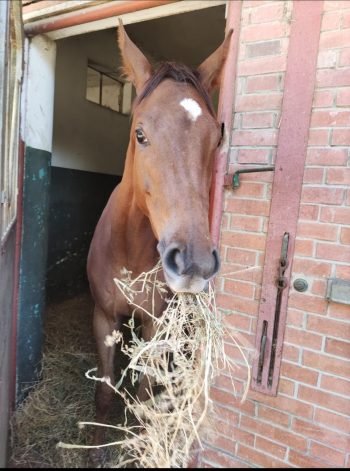
Jangchub enjoying her new home at Aquila Nero Animal Sanctuary.
Benefiting animals in any way possible is a high priority for FPMT and one of Lama Zopa Rinpoche’s Vast Visions for the organization. Lama Zopa Rinpoche has explained many ways that we can benefit animals, not just by saving them from untimely death and caring for them for the rest of their lives, but also by benefiting them with mantras, prayers, and holy objects.
We invite you to join us in rejoicing in a few of the ways the Animal Liberation Fund has benefited animals in recent months.
Jangchub is a two year old female horse who was born with a genetic problem with her feet. She is not able to run and can only gallop. Because of this, she was seen as useless and was going to be put down. Aquila Nera Horse Sanctuary in Italy, which has a close connection with Istituto Lama Tzong Khapa, offered to let Jangchub live the rest of her life at their facility and cover her vet and medical expenses. The Animal Liberation Fund sponsored her food for the year.
Please enjoy this touching video of Jangchub’s arrival to the sanctuary: https://youtu.be/iCIH54Z0DbU
Due to his concern for the welfare of all living beings, Lama Zopa Rinpoche initiated the purchase of and raised the funds for the land near Kopan Monastery for the Animal Liberation Sanctuary to provide shelter and care for animals rescued from being killed, so that they may live out their natural lives in peace and attain a higher rebirth. The sanctuary benefits rescued animals, not only by freeing them from impending death, but also by exposing them to Buddha’s teachings. They regularly hear mantras and are led around holy objects. The animals are receiving shelter, food, veterinary care, kindness, and Dharma. The sanctuary has a main animal shelter designed to provide a healthy environment throughout Nepal’s seasons, has facilities to separate weaker animals from the main flock, and is designed to reduce water use and waste. The sanctuary has an animal shed, treatment and isolation building, quarantine area, and caretaker house. Every year since 2012 we have been supporting this sanctuary with an annual grant, and in 2021, US$9,800 was offered. Since 2018, US$79,400 has been granted to the sanctuary for the food, medical care, shelter, and support for the caretakers.

Rescued goats receiving a blessing from Lama Zopa Rinpoche in Kathmandu, Nepal. Photo by Ven. Lobsang Sherab.
Over the last few months Rinpoche has bought fifteen goats from butchers on the side of the road in Kathmandu. These animals were liberated on behalf of His Holiness the Dalai Lama, all the Kopan monks and nuns, and for the Indian and Nepali people to be free from COVID-19. The goats were saved from death and will live the rest of their lives at the Animal Liberation Sanctuary or at Kopan Nunnery. Whenever Rinpoche sees goats tied up near the butcher shop, it is very hard for him not to buy the goats, often he stops the car and loads the goats without delay. If it is not possible to buy the goats, then Rinpoche will immediately start extensive prayers for them.
Taru Gayphel Tsogspa Animal Welfare Society is an animal care facility located in Ladakh caring for eighty-five animals. The Animal Liberation Fund recently offered a grant of US$20,000 for the continual care of all the animals at the facility for food, medicine, and shelter; and for upkeep of the premises. Additionally, Lama Zopa Rinpoche asked that eight five-foot high stupas also be built on the land, so that the animals can circumambulate the stupas.
The Animal Liberation Fund sponsored the liberations of approximately 71,791 animals at Kachoe Dechen Ling, California, and Buddha Amitabha Pure Land, Washington State, in 2020. Since 2015, 884,246 small animals have been saved from untimely death by resident Sangha and taken around an incredible number of holy objects. Mantras were recited and blown on them, and they were carefully placed where they could live out the rest of their lives. When Sangha finish these liberations, they make strong prayers for all those who are sick, have recently died, or who have requested prayers, as well as for the very long life of Lama Zopa Rinpoche and His Holiness the Dalai Lama. All are welcome to request prayers and dedications from the Sangha for themselves or loved ones.
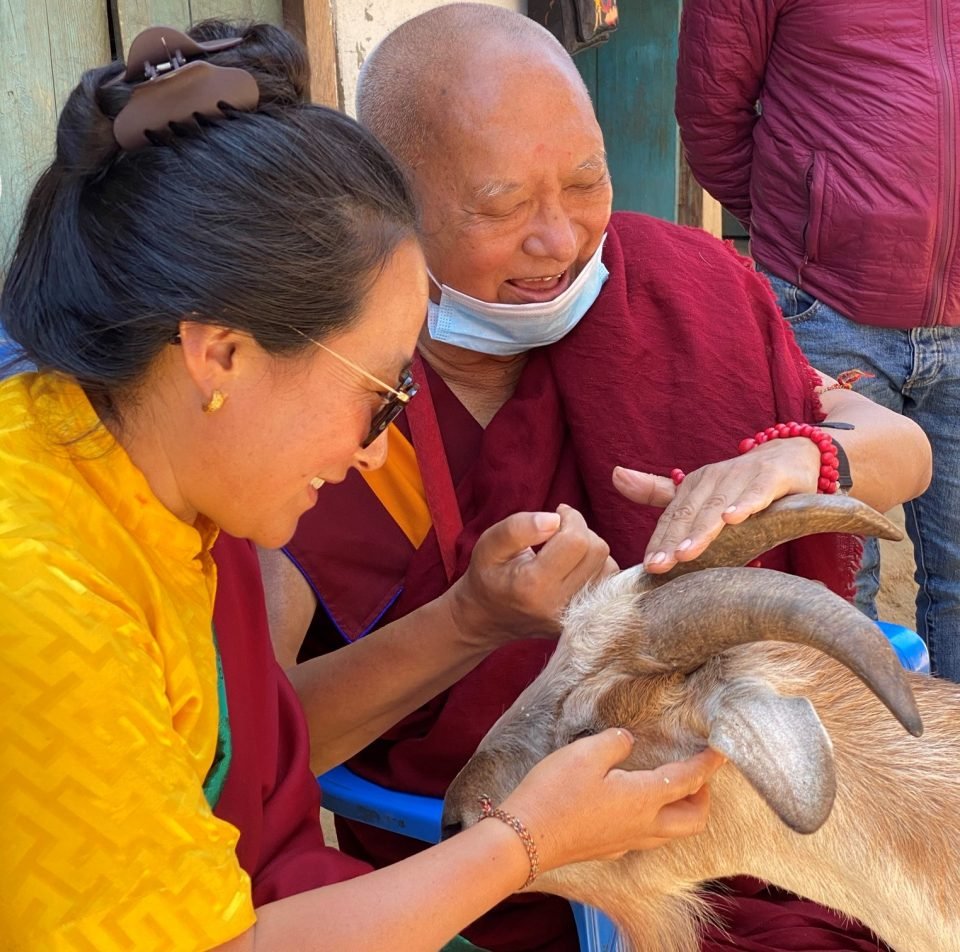
Khadro-la and Lama Zopa Rinpoche blessing goats in Maratika, Nepal, April 25, 2021. Photo by Ven. Roger Kunsang.
In 2018 Lama Zopa Rinpoche saved five goats that were destined to be killed in Maratika, Nepal. Since then we have been providing the cost of their food and care. And in 2021 Rinpoche and Khadro-la blessed the goats while they were in Maratika, reciting mantras and prayers for the goats and tying a blessed red cloth around their necks, which apart from being blessed with mantras, also shows that the animals have been saved from the butcher. The animals live in town, go out to pasture during the day, and are often seen at the Maratika Cave. They are fed well, get medical attention when needed, and prayers are done for them.
Please rejoice in another year of support offered to precious animals around the world who desperately need our help and cannot advocate for themselves or create merit on their own.
All are welcome to contribute to the Animal Liberation Fund to help ensure that our work sponsoring animal liberations around the world continues.
- Tagged: animal liberation fund, animal liberation sanctuary, Aquila Nera Horse Sanctuary, Taru gayphel tsogspa animal welfare society
27
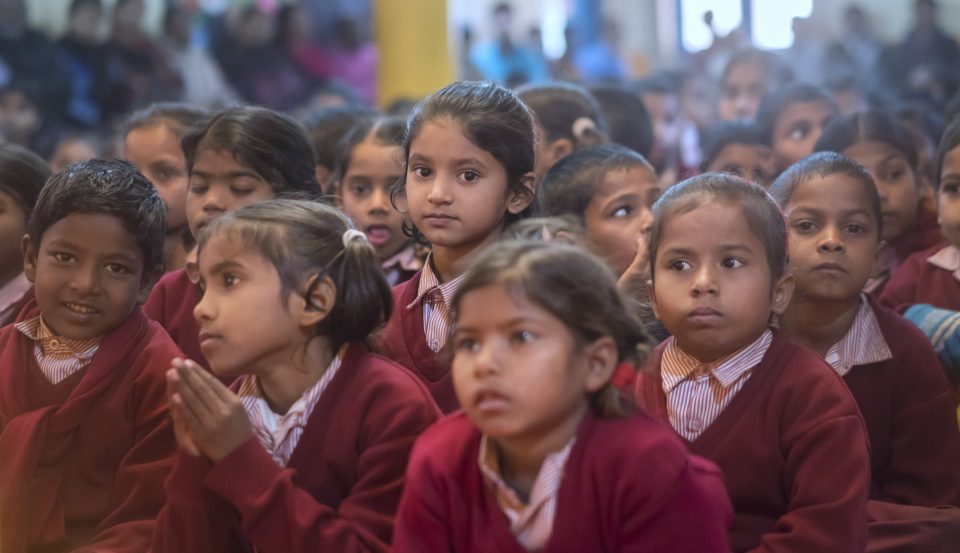
Students of Maitreya School, Bodhgaya, India.
Since 2012 the Social Services Fund has been supporting disadvantaged schools in Nepal and India that have students of Tibetan, Nepali, Sherpa, and Indian heritage. Approximately 1,000 children in orphanages, hostels, and Tibetan refugee communities benefit from this aid.
We invite you to rejoice in the ways we offered educational support to these children this year, thus helping break the cycle of poverty in impoverished areas and to help facilitate both a modern education and Dharma education for those in need.
Schools Supported in 2021
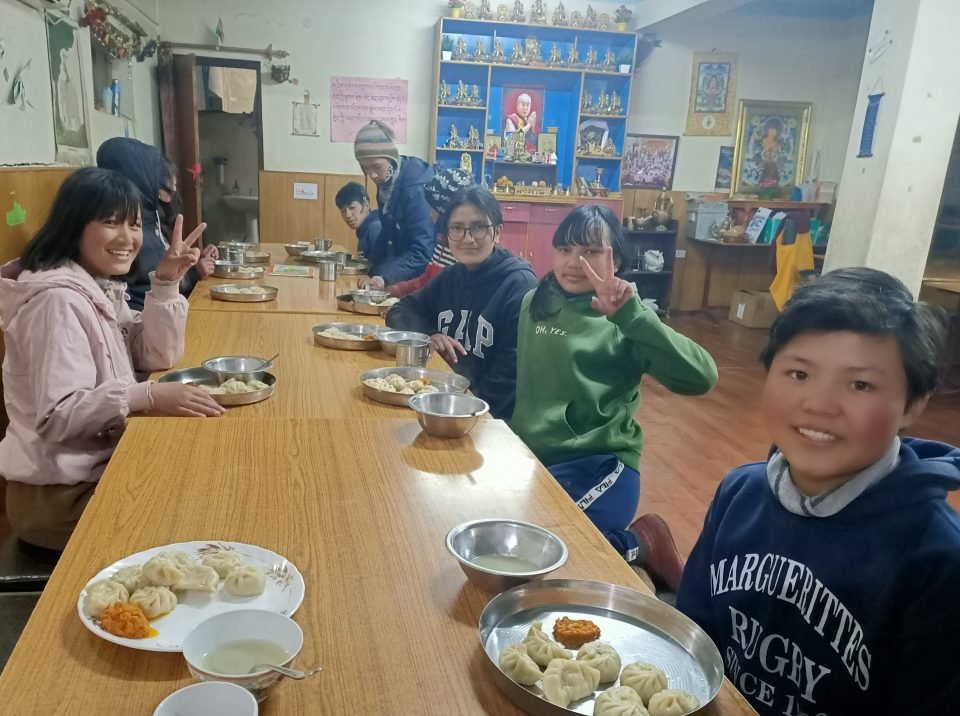
Students of Ngari Institute, Ladakh, enjoying a meal together.
Ngari Institute in Ladakh, India, helps disadvantaged children from remote regions of Ladakh and arranges to send them to, currently, three different schools. The Institute arranges all the costs related to offering this education, including the facility fees, food, uniforms, etc. The Social Services Fund has been covering all the costs of the food for the children and the teachers for eight years. This offering started in 2013 at US$15,720.62, and this year we were so happy to issue a grant for US$33,232.
Rolwaling Sangag Choling Monastery School, established in 2010, educates thirty-two children from poor families across the Dolakha District of Nepal at the primary school level and provides free boarding, medical attention, clothing ,and other needs to its students with the help of four teachers. A number of monks from the local monastery also attend this school. Many Kopan monks come from Rolwaling, so FPMT’s relationship with this school is quite special. It is a free school that also teaches Dharma. We were very happy to send a grant of US$19,187 for the operating costs of this school this year.
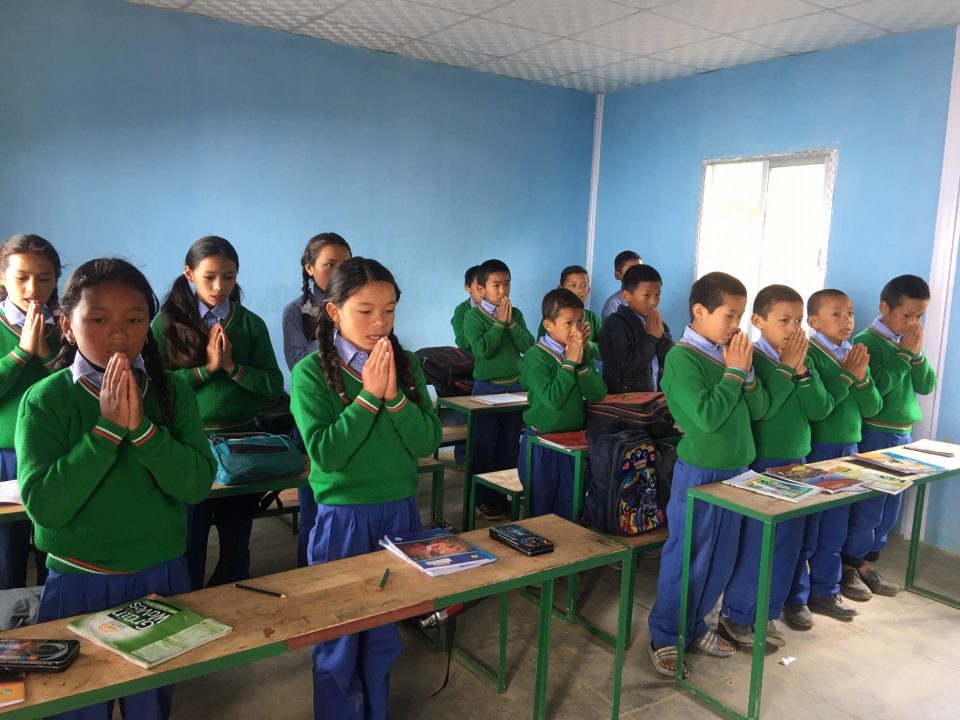
Some of the students of Sangag Dechholing Gonpa School, Taplejung, Nepal.
Sangag Dechholing Gonpa School in Taplejung, Nepal, was established in 2007 to serve the Buddhist community in the area. Seven teachers currently educate 105 students, starting at age three. The curriculum is taught by eleven staff in English and Nepali and focuses on modern subjects such as math and science, while being grounded in Buddhist teachings and culture. In 2021, US$29,908 was sent for operating expenses, which is the annual cost of this free school. Kopan Monastery is now taking over responsibility of this school and FPMT is helping to raise the annual costs through our Social Services Fund.
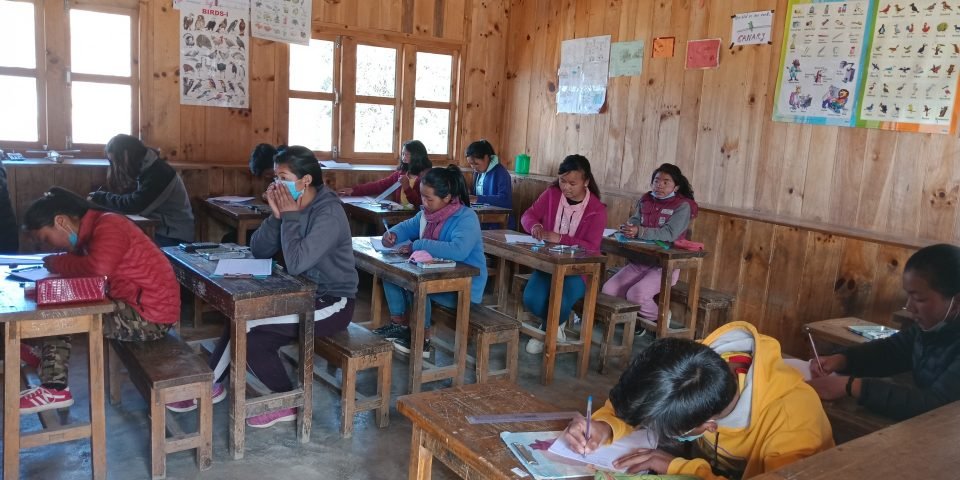
Students of Sagarmatha Secondary School in Chailsa, Nepal.
Sagarmatha Secondary School in Chailsa, Nepal, is located on what was once a Tibetan refugee camp. It currently serves 170 students, including 79 young lay students who live at the school hostel and 25 young monks who live at Thubten Shedrup Ling Monastery, which is a branch of Kopan Monastery and shares the school grounds. Eleven teachers and one additional employee support these students. Since 2015 we have offered annual grants to the school that covers the salaries of teachers in addition to yearly text books and one set of school uniforms per year for the students. We are very happy to continue this commitment with the very year kind help of Yeshe Norbu Association and Unione Buddhista Italiana (U.B.I.). The annual cost is US$30,000 and will be offered at the end of 2021.
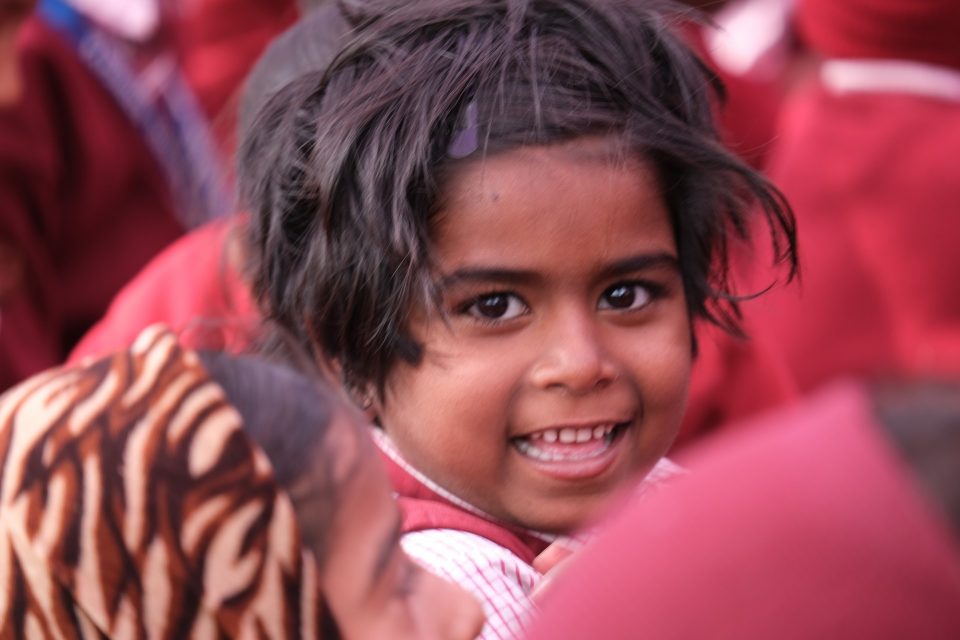
A young student of Maitreya School, Bodhgaya, India.
Maitreya School, which is a social service project of Root Institute, Bodhgaya, India, is a free school benefiting impoverished children from neighboring villages. The school offers children living in one of India’s poorest states a precious opportunity. Not only do they engage in a traditional education but, more importantly, they receive life skills in compassion, honesty, and loving-kindness presented through Buddha’s teachings. The core of the training and vision of the school is: making lives meaningful. The school has a total of 305 students. Since 2012 we have offered yearly support toward the operating costs as well as two new buses for transporting students. In 2021 we offered US$39,200 toward the annual costs of operating the school. The last year the school has been operating in various ways online.
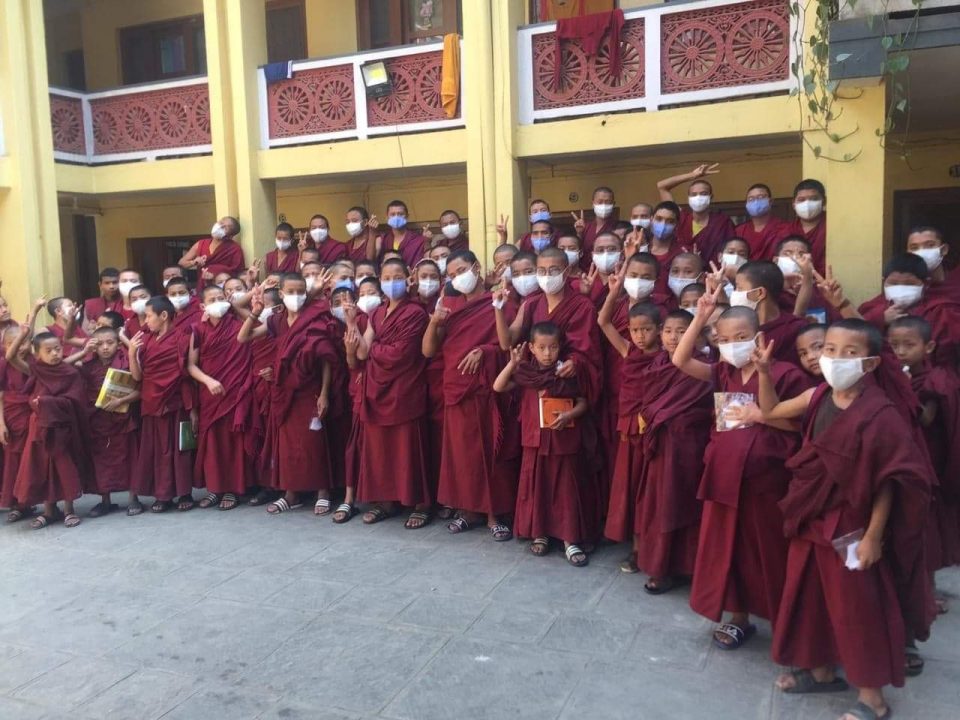
Students of Samtenling School, Khathmandu.
Samtenling Monastery provides the young monks of the monastery a modern, progressive, secular education in Kathmandu, Nepal. Out of 140 monks, 120 of them are aged 6-26. Samtenling School provides education from kindergarten through grade eight. Most of the monks are from Nepal and are primarily Sherpas and Tamangs, but Tibetan monks also attend the monastery and school. The school has been operating without proper facilities. To help with this need, we have been issuing a grant raised from Unione Buddhista Italiana (U.B.I.) in installments over the past two years to build new classrooms and debate courtyard.
In 2021 we offered US$40,402 toward Tashi Lhunpo Monastery in South India for their educational program, covering the salaries of all the teachers and staff, as well as textbooks, stationary, and other resources.
Please join us in rejoicing in another year of support offered to these beneficial schools due to the kindness of so many. Incredibly, US$161,930 was offered toward education this year. Thank you to all the kind donors, including Yeshe Norbu Association and Unione Buddhista Italiana (U.B.I.) who made it possible to offer this substantial support.
The Social Services Fund, established to support Lama Zopa Rinpoche’s Vast Visions for the FPMT organization, focuses efforts primarily in India, Nepal, Tibet and Mongolia. Funds help children, the elderly, sick, and very poor.
All are welcome to support the Social Services Fund and help ensure we can continue to offer support to the education of children in need.
- Tagged: maitreya school, ngari institute, ngari institute of buddhist dialectics, rolwaling sangag choling monastery school, sagarmatha secondary school, samtenling school, sangag dechholing gonpa school
13
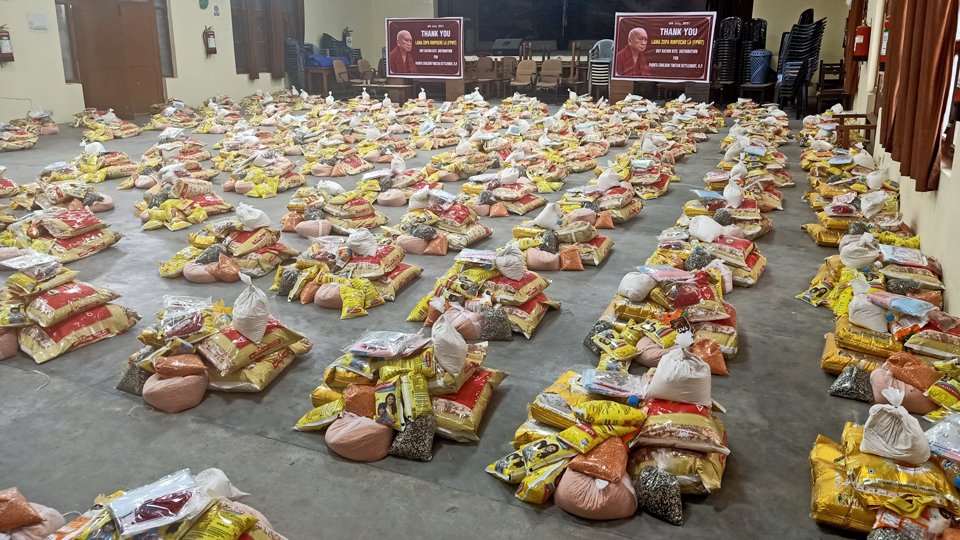
Food ready for distribution, Paonta Cholsum Tibetan Settlement, Himachal Pradesh, India, July 2021. Photo courtesy of Paonta Cholsum Tibetan Settlement.
The COVID-19 pandemic has created hardship around the world. Paonta Cholsum Tibetan Settlement, located in Paonta Sahib Himachal Pradesh, India, has lost a significant source of income due to lockdown restrictions. The settlement recently reached out to Lama Zopa Rinpoche for assistance with food.
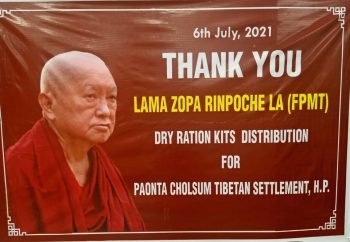
Banner at food distribution site, Paonta Cholsum Tibetan Settlement, Himachal Pradesh, India, July 2021. Photo courtesy of Paonta Cholsum Tibetan Settlement.
On the occasion of His Holiness the Dalai Lama’s 86th Birthday, Mr Gelek Jamyang, the settlement officer, wanted to make an auspicious offering to help 125 families with food. Lama Zopa Rinpoche was extremely happy to be able to offer support in this way and through FPMT Social Services Fund. The food offered to the 125 families included essential staples of rice, atta (wheat flour), cooking oil, dal, and eggs.
According to the settlement officer, ninety percent of the settlers earn their livelihood through winter sweater sales in different states of India. Due to COVID-19 restrictions, winter sweater sales have not happened for two years. The settlement relies on the sales income to support their daily expenses.
Please rejoice that we were able to join in this offering made on the occasion of His Holiness the Dalai Lama’s birthday.
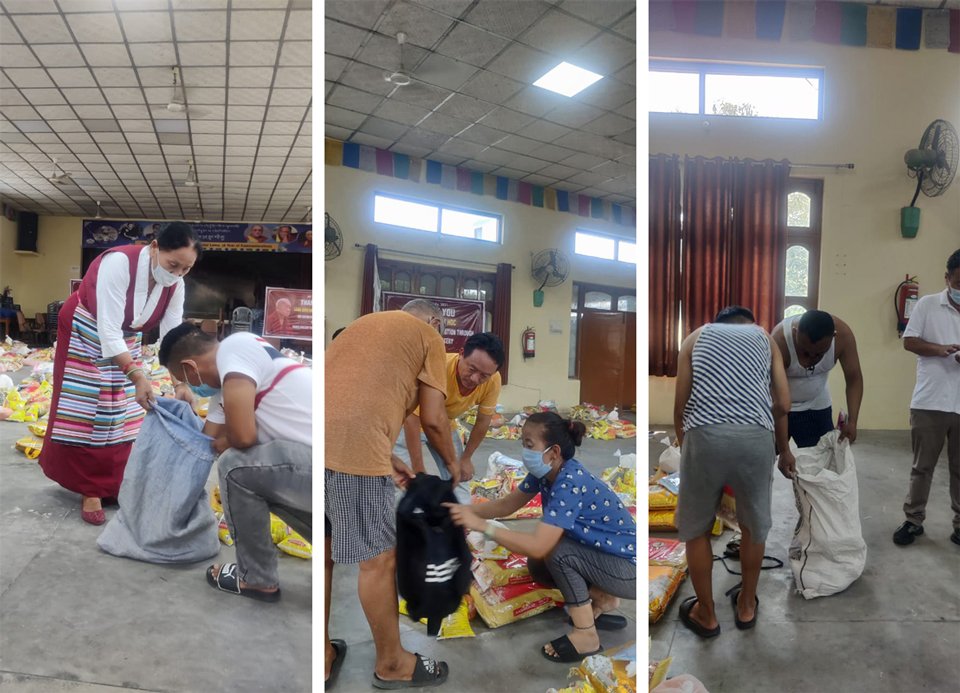
Images of the food distribution on His Holiness the Dalai Lama’s birthday, Paonta Cholsum Tibetan Settlement, Himachal Pradesh, India, July 2021. Photo courtesy of Paonta Cholsum Tibetan Settlement.
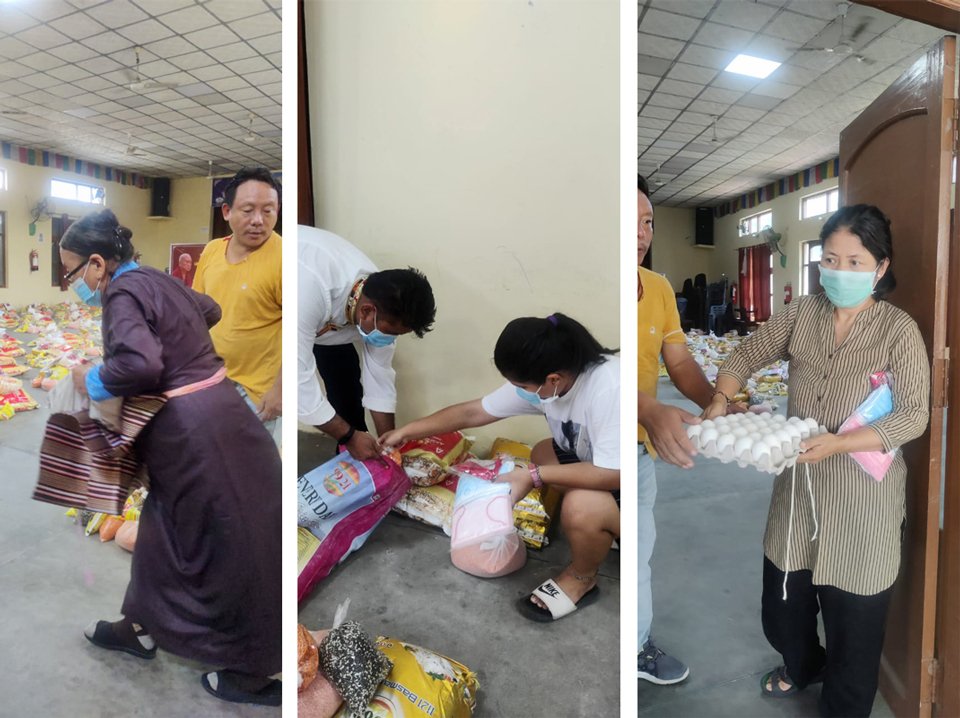
Images of the food distribution on His Holiness the Dalai Lama’s birthday, Paonta Cholsum Tibetan Settlement, Himachal Pradesh, India, July 2021. Photo courtesy of Paonta Cholsum Tibetan Settlement.
All are welcome to support the Social Services Fund and help ensure we can offer direct support to Tibetan refugees in need.
7
Support to Seven Elderly Homes Serving Tibetan Elders in 2021
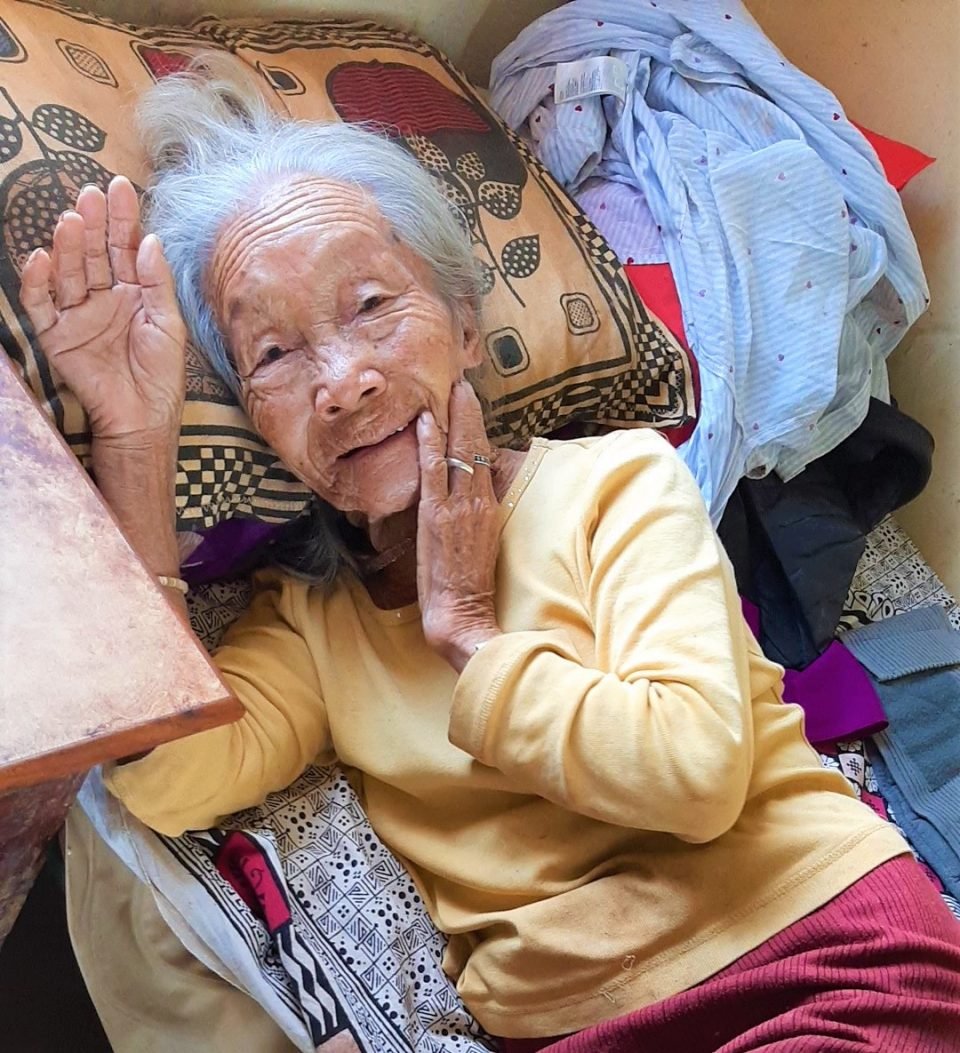
An elder of Dhondenling Old People Home, Kollegal.
Since 2015, the FPMT Social Services Fund has been offering support to hundreds of Tibetan elders residing in elderly homes throughout India. Tibetans have been living in exile since 1959 when Communist China invaded Tibet, forcing 100,000 Tibetans to flee to India, Nepal, Bhutan and eventually elsewhere around the world. Many of the Tibetan refugees in India and Nepal are now elderly and many are rendered destitute and in desperate need of care at this critical phase of life. Tibetan families traditionally provide for the elderly and sick among them. However, when a family itself is in deep poverty, or if the elderly individual is alone and without family support, help is needed.
Lama Zopa Rinpoche has encouraged us to not only address residents’ material needs such as food and shelter, but also their spiritual ones. With this in mind, we’ve also sponsored holy objects such as stupas and prayer wheels on the premises of some of these homes as well, encouraged the recitation of sutras and mantras, and provided grants to ensure the elders have adequate and appropriate space for Dharma practice and merit-making group activities.
In 2021 we sent US$286,887.28 to support seven elderly homes in India. Please join us in rejoicing that these grants were used in the following ways:
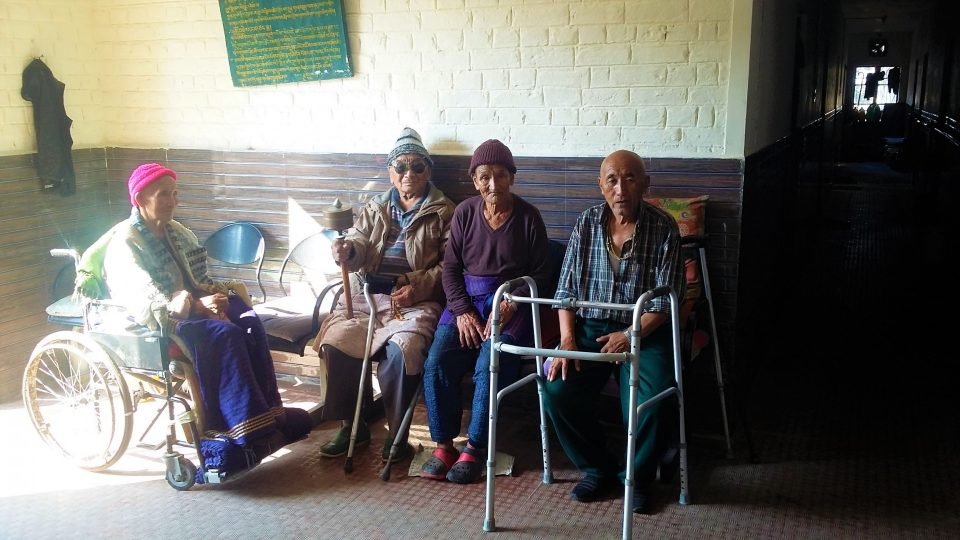
Elders of Jampaling Elder’s Home, Dharamsala.
Elderly Homes Supported in 2021
Jampaling Elder’s Home, Dharamsala, provides food, shelter and medical services to 156 residents. US$13,914 was offered for shortfall of their 2021 operating budget.
Lugsam Samduling Home for the Aged and Disabled, Bylakuppe, looks after 46 elderly individuals who are living in extremely modest conditions, many with health issues due to the advanced age. US$39,354.65 total was offered to this home to cover budget shortfall for 2021 and for an ambulance for the settlement’s hospital, Tsojhe Khangsar Hospital. This ambulance will be used by the people of two Tibetan Settlements and there are around 20,000 people, including Himalayan monks and nuns, residing in the various monasteries.
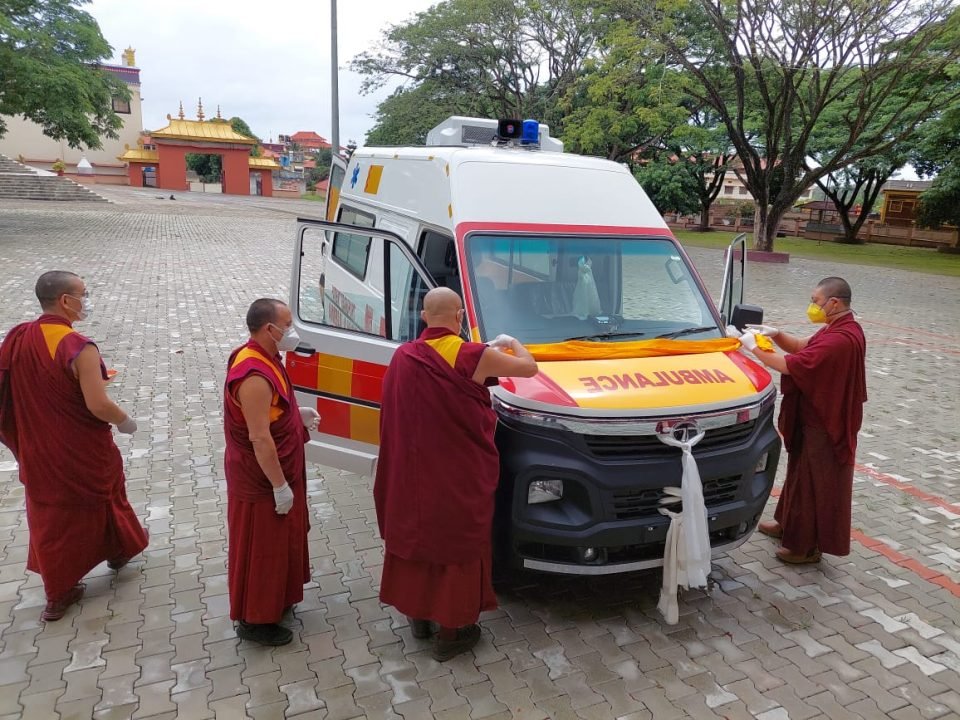
Sera Je monks consecrating new ambulance sponsored for Tsojhe Khangsar Hospital.
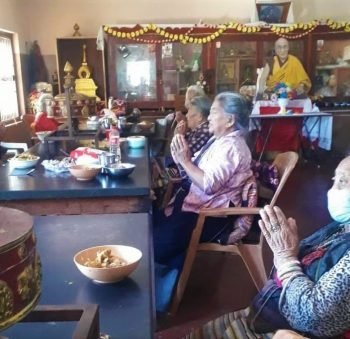
Elders of Dhondenling having morning prayer before breakfast.
Doeguling Home for Elderly and Disabled, located in the Doeguling Tibetan Refugee Settlement in Mundgod, cares for 103 elderly residents. US$41,745 was offered for food, medical expenses, and an investment into the corpus fund which contributes to the sustainability of the home.
Dhondenling Old People Home, Kollegal, is in one of the most remote and underdeveloped Tibetan settlements in southern India. The elderly home has a capacity for 32 elderly Tibetans residents. US$28,314.63 was offered to cover 70% of their annual operating budget and a separate grant from Buddha Union of Italy of US$48,628.87 was offered for the final costs of community hall that is being built.
Rabgayling Tibetan Family Welfare Association, Hunsur, has an elderly home serving 20 residents. US$25,813.33 was offered this year for their medical fund and recurring expenses.
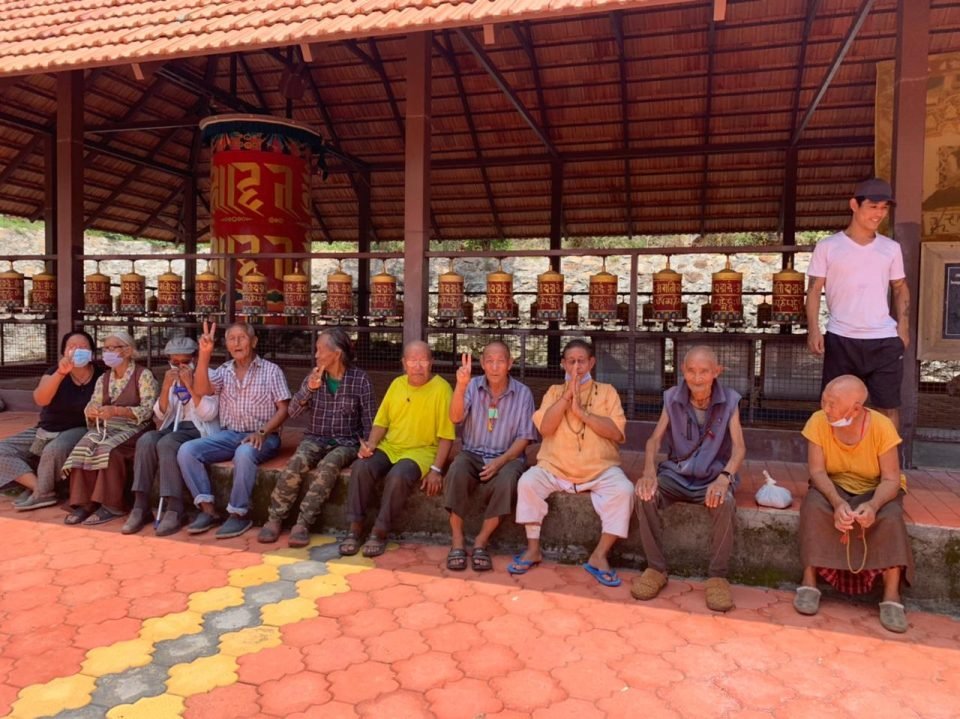
Elders of Rabgayling Tibetan Family Welfare Association home in front of prayer wheels.
Chauntra Dhonden Old People’s Home, Bir. US$69,570 was offered this year for installation of new metal roofing sheets and repair and maintenance. This home home cares for 24 elders and the support was requested on behalf of the Tibetan government and this was our first year supporting this home.
Old People’s Home Odisha Phuntsokling Settlement, Orissa, is a home caring for 19 Tibetan elders. There are also five monasteries on this settlement as well as two primary schools, one middle school, and a nursery for babies. US$19,546.80 was offered for their annual budget which they desperately needed after losing their main sponsor of ten years. This is our first year supporting this home.
The Social Services Fund also provides charitable giving to children, the sick, and the very poor through a variety of grants every year.
Thank you to all the donors who make this most urgent and critical support for Tibetan elders possible.
All are welcome to support the Social Services Fund and help ensure we can offer direct support to the elderly.
4
Tibetan Elders Creating Merit in Elderly Homes in India
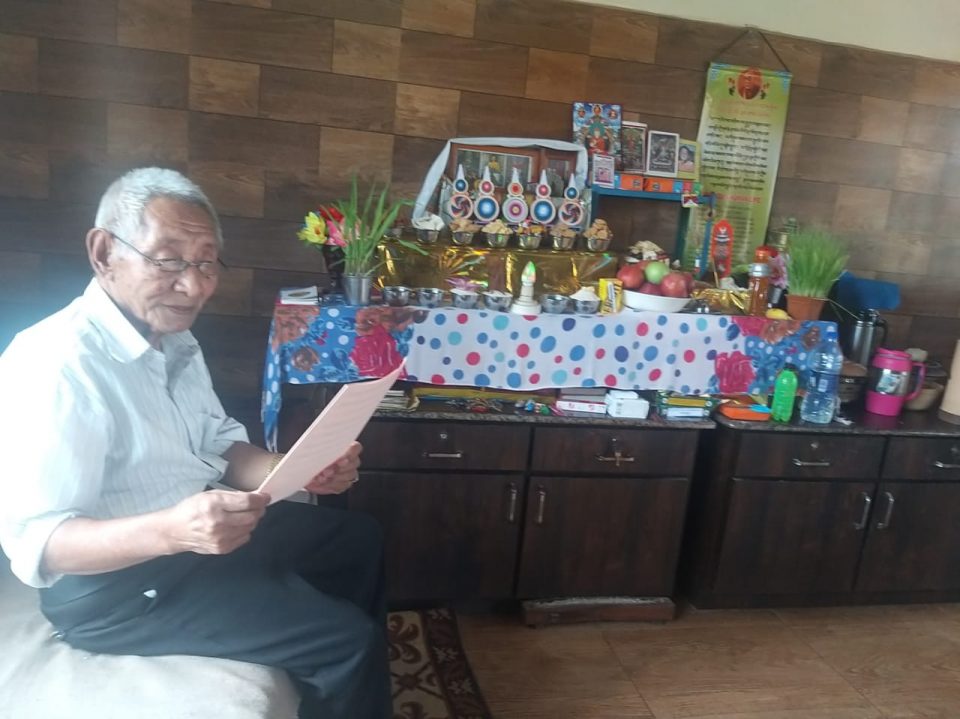
A Tibetan elder from Lugsum Sanduling, Bylakuppe, reciting the Diamond Cutter Sutra on Lama Zopa Rinpoche’s advice.
Advice for the Elderly
Lama Zopa Rinpoche recently offered extensive advice on different ways to help and benefit the elderly, particularly Tibetans in Nepal and India, who are Buddhist. Rinpoche has made the point that as Buddhists we shouldn’t only give charity of food and shelter to the elderly—we also can offer Dharma to them as well. In this recent teaching, Rinpoche mentioned the importance of using the time when one is in an elderly home to create merit and purify as much as possible, for example by listening to Dharma teachings and reciting sutras. Rinpoche explained the importance of displaying certain mantras and images of holy objects, buddhas, deities, and Buddha pure lands so the elders can look at beautiful images and pray to be reborn there.
Rinpoche also composed a text for the elders to recite, similar to the Method to Transform daily motivation practice.
Dhondenling Tibetan Settlement, located in Kollegal, India, is the most remote and underdeveloped Tibetan settlements in southern India. The settlement consists of twenty-two villages, and an elderly home. The elderly home has a capacity for thirty-two elderly Tibetans residents which FPMT Charitable Projects has been supporting since 2015. Rinpoche requested that the elders recite the Vajra Cutter Sutra regularly and also, from time to time, to receive Dharma teachings. After receiving this advice they immediately arranged for two weeks of teachings on the Vajra Cutter Sutra from a qualified teacher. This advice was also shared with Lugsum Samduling Home for the Aged and Disabled, a home in Bylakuppe, India, which cares for thirty-seven aging Tibetans. They were very happy to receive this personal advice from Rinpoche and sent photos and videos of the elders reciting the sutra and also receiving teachings and the oral transmission of the sutra.
Please enjoy this video of the elders of Lugsum Samduling reciting the Vajra Cutter Sutra:
https://www.youtube.com/watch?v=snLBD48GRlM
Rinpoche always advises elderly homes and hospices to have beautifully framed holy images at the facility so the elders can always see them and create merit. Rinpoche also suggests to always display Namgyalma mantras in every room so that even mosquitoes, ants, and insects get purified while they are in that particular room. In addition, to have an image of the deity Amoghapasha for the people in the home. Seeing this deity purifies the five heavy negative karmas without break and the negative karma of abandoning holy Dharma. Rinpoche also advises having thangkas of different pure lands, so—depending on the pure land you have an affinity for—one can look at that particular image of the pure land and make prayers to be reborn there. Rinpoche also has explained the benefits of playing mantras, sutras, and Dharma teachings, and if possible to go around holy objects or turn prayer wheels. All of these activities leave positive imprints on the mind and this is so important, especially when one is close to passing.
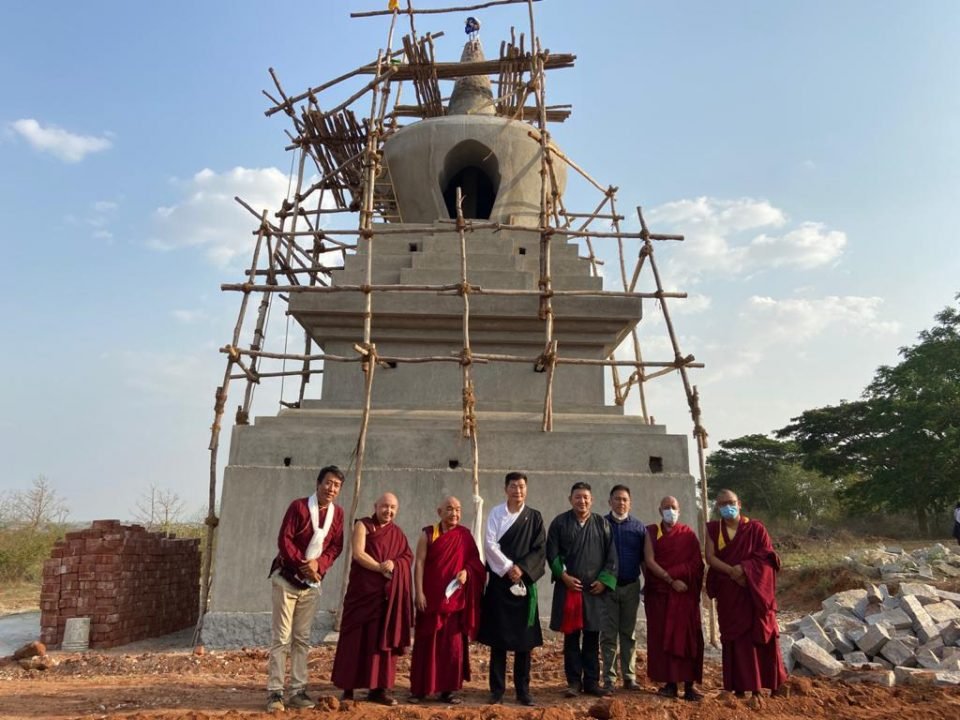
President of Tibet, Sikyong Dr. Lobsang Sangay, with others in front of the stupa being built in Hunsur.
For six years, FPMT Charitable Projects has been supporting Rabgayling Old Aged Home in Hunsur, India, which is part of the Rabagayling Tibetan Settlement and serves twenty elderly residents. Over several years, funds have been offered for daily food for the residents, for the annual operating costs of the elderly home, the building of accommodation for the residents, medical needs, and a community hall. Most recently, a 35-foot stupa has been sponsored near the elderly home on the settlement. This stupa is being built for the all the people in the Tibetan settlement, but in particular for the elders, as it is close to the elderly home and they can circumambulate it without much difficulty. This is an easy way for the elders to collect merit and purify negative karma by going around the hold object. Recently the previous President of Tibet, Sikyong Dr. Lobsang Sangay, visited the stupa.
Advice for Those Who are Dying
Rinpoche has also offered extensive advice for those who are dying or have recently died including how to make the environment very beautiful and uplifting so that people can enjoy and not feel depressed as well as general advice for what thangkas, mantras, prayers, or books are most beneficial.
Please rejoice in the various ways we are offering direct support to elders, such as completely covering or helping with the annual expenses for a number of elderly homes in India, and also how Rinpoche is helping with offering advice for ultimate support, such as inspiring the elders to use their time creating merit and offering advice on how to help at the time of passing.
Lama Zopa Rinpoche offered details about the recent advice he offered to Tibetan elderly in the thought transformation teaching “Some Ways in Which Rinpoche is Benefitting People.”
All are welcome to support the Social Services Fund and help ensure we can offer direct support to the elderly.
- Tagged: advice for death and dying, elderly, elderly homes, hospices, social services fund, tibetan elderly
27
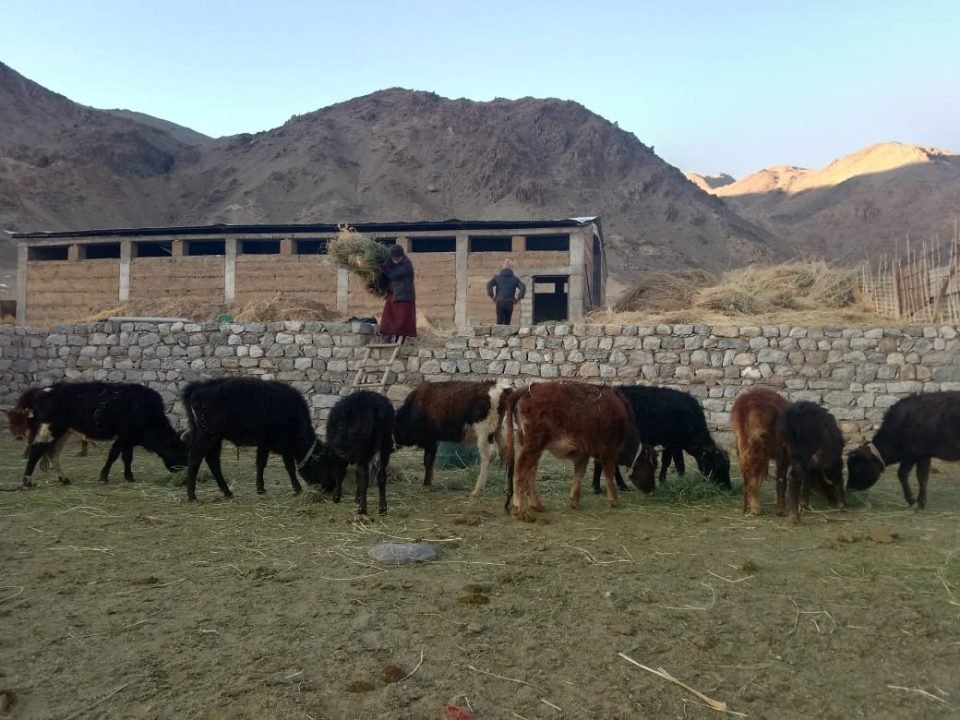
Cows being cared for by Taru Gayphel Tsogspa Animal Welfare Society.
Taru Gayphel Tsogspa Animal Welfare Society is an animal care facility located in Taru, Leh, Ladakh. Tsering Dorjay Malik first developed the idea in 2013 to help the animals in the village by drawing inspiration from Buddha’s teachings that every living being has Buddha nature and is deserving of care and kindness.
In the village, abandoned donkeys, cows, and other farm animals were running around loose, many of whom were victims of road accidents or could not find the necessary resources to survive. Taru Gayphel Tsogspa Animal Welfare Society started by rescuing these animals, offering care, and feeding them. In the beginning there were many challenges due to there not being enough food, shelter, and medicine for the animals. Slowly, concerned animal lovers in the area began supporting this project, but even with this interest, and also due to the increasing numbers of animals needing care, the available resources were exhausted and it was not possible to accept more animals.
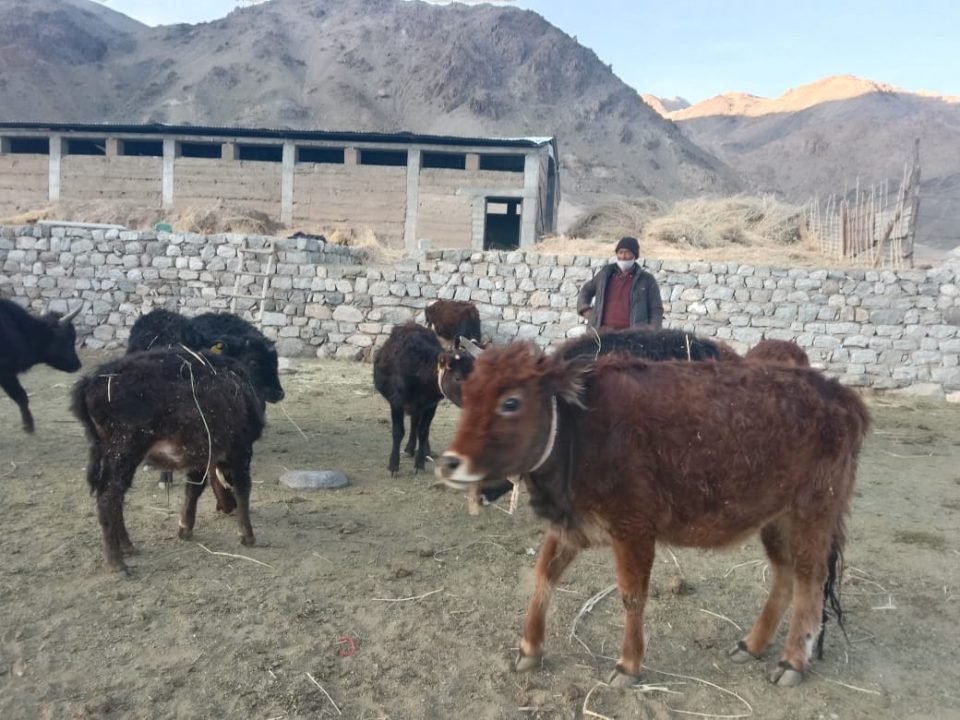
Cows of the Taru Gayphel Tsogspa Animal Welfare Society.
Currently there are fifty bulls, twenty cows, ten sheep, and five donkeys being cared for at Taru Gayphel Tsogspa Animal Welfare Society, many of these animals have been saved from death and now are able to live the rest of their lives for on the land.
Thanks to the kindness of a generous donor, the Animal Liberation Fund recently offered a grant of US$20,000 for the continual care of all the animals at the facility including for food, medicine, and shelter; and for upkeep of the premises. Some of these funds will also be used for essential needs such as:
- Building ten new animal sheds
- Compound walls for the center which is nearly 54,000 square feet
- Staff accommodation on the premises and salaries for four caretakers
- Medical care for sick and injured animals
- Food for all the animals (the total for this alone is US$59,000 a year)
Thank you to all the kind donors of the Animal Liberation Fund and the Stupa Fund who enabled us to make these grants, and benefit over 100 animals.
All are welcome to support the Animal Liberation Fund and Stupa Fund and help ensure beneficial grants like this can continue.
- Tagged: animal care, animal liberation fund, animal rescue, animals, social services fund, stupa fund
18
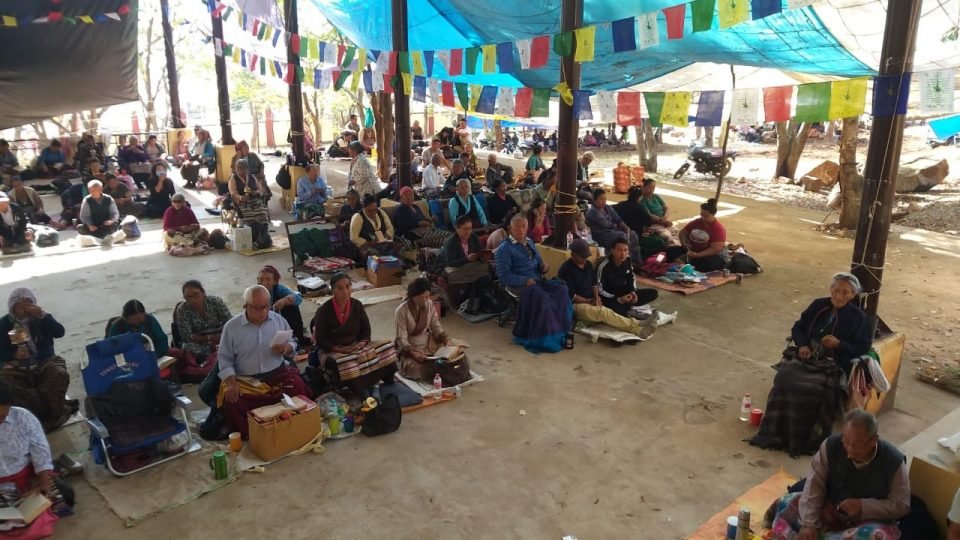
Community prayers and recitation of Amitabha mantra at Dhondenling Tibetan Settlement, under tents without a community hall.
Dhondenling Tibetan Settlement, Kollegal, is in one of the most remote and underdeveloped Tibetan settlements in Southern India.
There are 46 Tibetan settlements in India, Nepal, and Bhutan, home to most of the 100,451 Tibetan refugees. These Tibetan settlements originate from the wish of His Holiness the Dalai Lama to set up settlements where Tibetan refugees could live as an exclusive community in order to preserve the unique Tibetan culture including language and the religious practices.
Dhondenling Tibetan settlement is located in the majestic Biligiri Rangam hills in Karnataka; it was established in 1974 with over 3,500 people.
The current population of the settlement is now 4,500. The settlement is scattered in 22 village clusters. There are eight small monasteries, a school, and a small care-home for elders (FPMT Charitable Projects has been supporting the elderly home for the past three years by providing 70% of the annual budget.) The elderly home has a capacity for thirty-two residents. There is also a hospital and a traditional Tibetan medicine clinic. These establishments cater to the religious, educational, and health-care of the residents of the settlement. The residents have formed a cooperative society to cater to the agrarian needs of the members. The principal livelihood occupation is agriculture raising mainly corn, with millet, potato, and garlic as optional crops.
Most Tibetan settlements in India, Nepal, and Bhutan have a multi-purpose community hall, as a central gathering place for all within the settlement to hold special religious and cultural functions. However, Dhondenling Tibetan Settlement, being one of the poorest settlements, did not have a community hall and any gatherings held for the 4,500 residents would happen outside under tents or tarps.
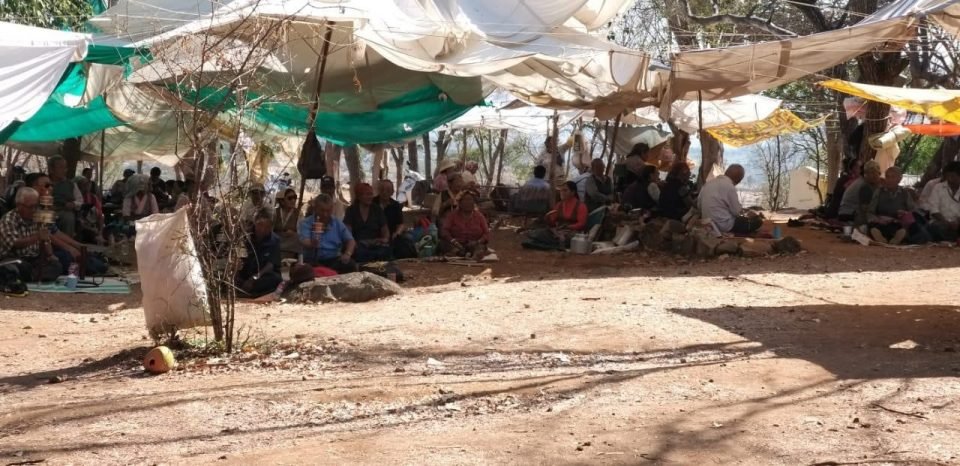
Community prayers continue at Dhondenling Tibetan Settlement despite the lack of proper accommodation for participants.
The community gatherings that happen throughout the year consist of:
- Public prayers for the long life of His Holiness the Dalai Lama, and other religious heads, and world peace
- Annual OM MANI PADME HUM recitation retreat and 100,000 Praises to Tara that require public attendance for over 45 days
- Celebration of religious and social festivals
- Dharma teaching discourses for the residents in general and the younger generation in particular
- Cultural programs and events by students to encourage children to participate in extracurricular activities
- Parent-Teacher interactive sessions to exchange ideas and development of partnership perspective concerning child upbringing and education
These gatherings and activities are vital for preserving the Tibetan cultural heritage and lineages and for providing community support for those living in the settlement.
Seeing the incredible need for this multi-purpose community hall in Dhondenling Tibetan Settlement, and recognizing how important it is to preserve the unique Tibetan cultural heritage, in 2020 we applied for and received a grant for the purpose of building this community hall.
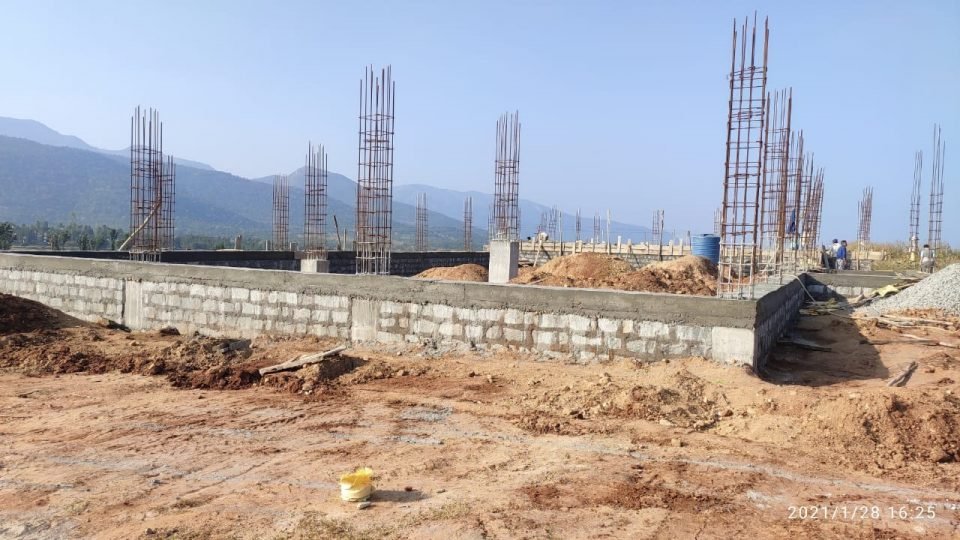
Site of the new community hall for Dhondenling Tibetan Settlement.
We were very happy to be a part of offering this support and US$158,741 was given to Dhondenling Tibetan Settlement for the building. In April 2020 they started the building process, buying necessary supplies for the foundations but quite soon due to COVID-19 restrictions which were strictly enforced by the government in South India, including in Dhondenling Tibetan Settlement, all building work was stopped in May. The lockdown was lifted after a few months, but there were still building restrictions and also restrictions in regards to outside people entering the Tibetan Settlement.
There was particular concern due to the fact that many people in the Tibetan Settlement live in very poor conditions and in close proximity. It was decided not to continue the building work of the community hall until the end of year (December 2020) due to precautions and to ensure not having too many outside laborers entering the Tibetan Settlement. All the building supplies that had been bought were carefully secured and protected during this time.
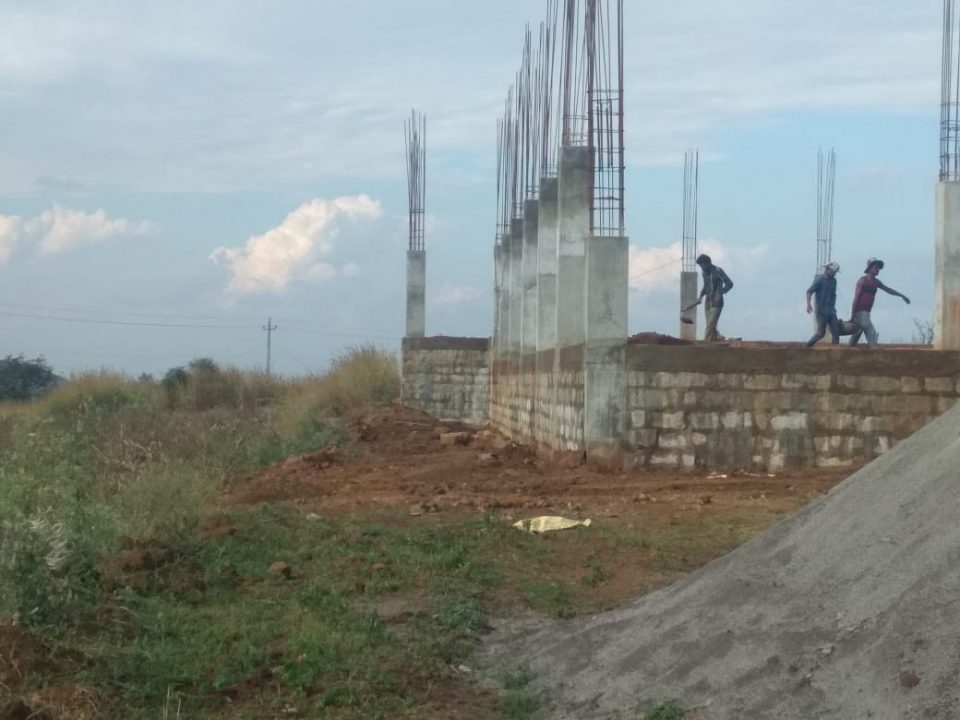
Work begins on this important community hall for 4,500 Tibetans.
From December 2020 to February 2021, the building work again commenced on the community hall. The work is going slower than expected, but is progressing.
We are extremely grateful to all who support the Social Services Fund, so that we can offer support such as this to Dhondeling Tibetan Settlement multi-purpose community hall for religious and cultural preservation and for the benefit of the 4,500 residents. Thank you.
All are welcome to support the Social Services Fund and help ensure beneficial grants like this can continue.
- Tagged: elderly, refugees, social services fund, tibetans
- Home
- News/Media
- Study & Practice
- About FPMT Education Services
- Latest News
- Programs
- New to Buddhism?
- Buddhist Mind Science: Activating Your Potential
- Heart Advice for Death and Dying
- Discovering Buddhism
- Living in the Path
- Exploring Buddhism
- FPMT Basic Program
- FPMT Masters Program
- FPMT In-Depth Meditation Training
- Maitripa College
- Lotsawa Rinchen Zangpo Translator Program
- Universal Education for Compassion & Wisdom
- Online Learning Center
- Prayers & Practice Materials
- Overview of Prayers & Practices
- Full Catalogue of Prayers & Practice Materials
- Explore Popular Topics
- Benefiting Animals
- Chenrezig Resources
- Death & Dying Resources
- Lama Chopa (Guru Puja)
- Lama Zopa Rinpoche: Compendium of Precious Instructions
- Lama Zopa Rinpoche: Life Practice Advice
- Lama Zopa Rinpoche Practice Series
- Lamrim Resources
- Mantras
- Prayer Book Updates
- Purification Practices
- Sutras
- Thought Transformation (Lojong)
- Audio Materials
- Dharma Dates – Tibetan Calendar
- Translation Services
- Publishing Services
- Teachings and Advice
- Find Teachings and Advice
- Lama Zopa Rinpoche Advice Page
- Lama Zopa Rinpoche: Compendium of Precious Instructions
- Lama Zopa Rinpoche Video Teachings
- ༧སྐྱབས་རྗེ་བཟོད་པ་རིན་པོ་ཆེ་མཆོག་ནས་སྩལ་བའི་བཀའ་སློབ་བརྙན་འཕྲིན།
- Podcasts
- Lama Yeshe Wisdom Archive
- Buddhism FAQ
- Dharma for Young People
- Resources on Holy Objects
- Ways to Offer Support
- Centers
- Affiliates Area
- Teachers
- Projects
- Charitable Projects
- Make a Donation
- Applying for Grants
- News about Projects
- Other Projects within FPMT
- Support International Office
- Projects Photo Galleries
- Give Where Most Needed
- FPMT
- Shop
Translate*
*powered by Google TranslateTranslation of pages on fpmt.org is performed by Google Translate, a third party service which FPMT has no control over. The service provides automated computer translations that are only an approximation of the websites' original content. The translations should not be considered exact and only used as a rough guide.If your daily life is tremendously involved in emotions, you are completely driven by them and psychologically tired. In other words, our physical emotions get too involved and we don’t understand the functioning of our six sense consciousnesses.







